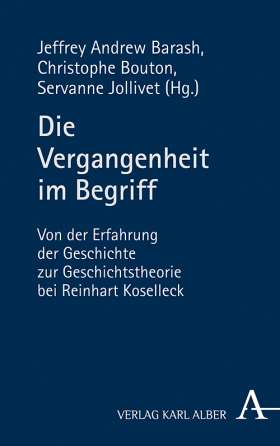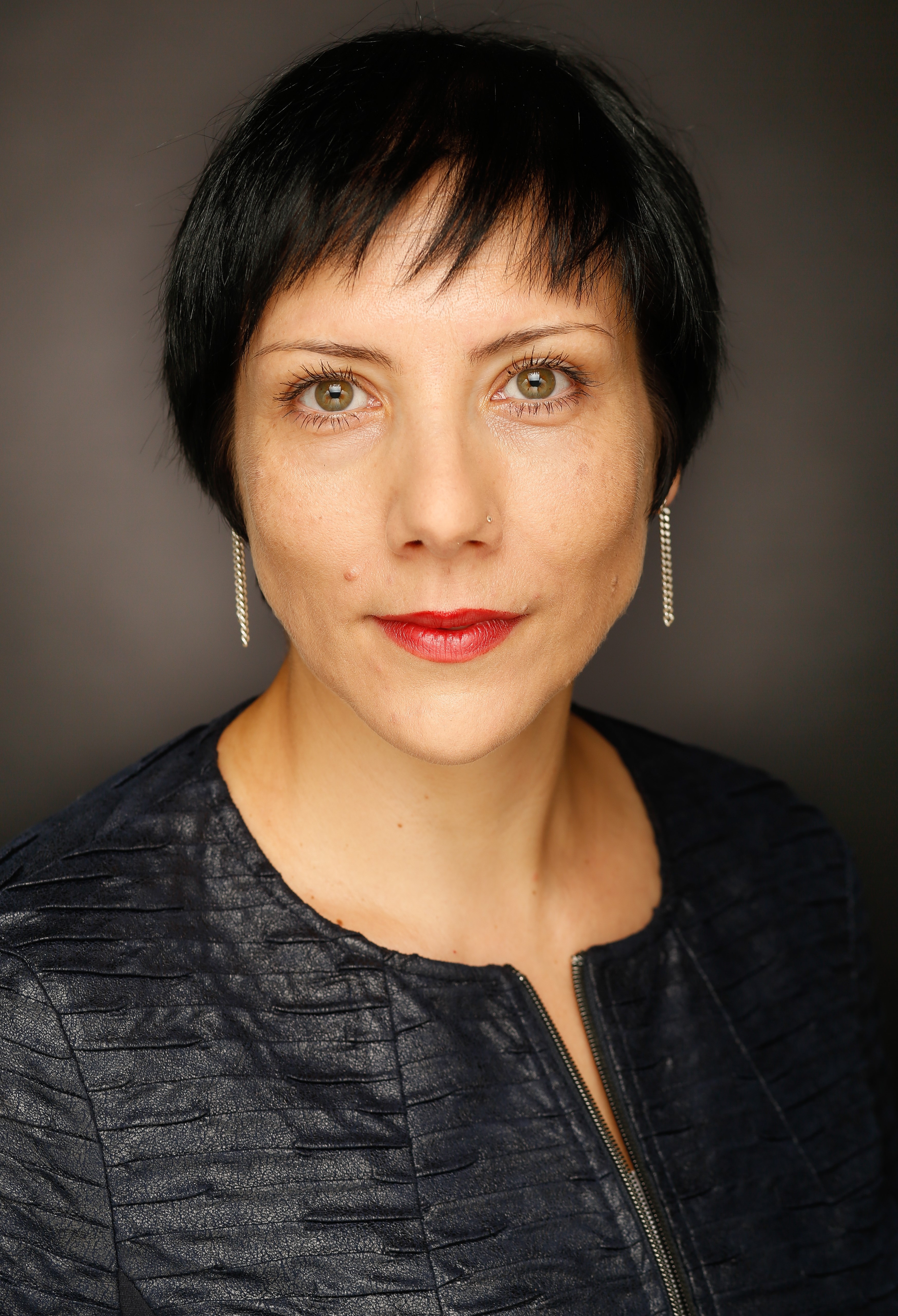Archive
Newly published:
Lisa Regazzoni
The uncertain Stuff of History: Outline of a Theory of Intentionality — Thing by Thing, in: History and Theory 63, H. 2 (2024), S. 186-218. DOI
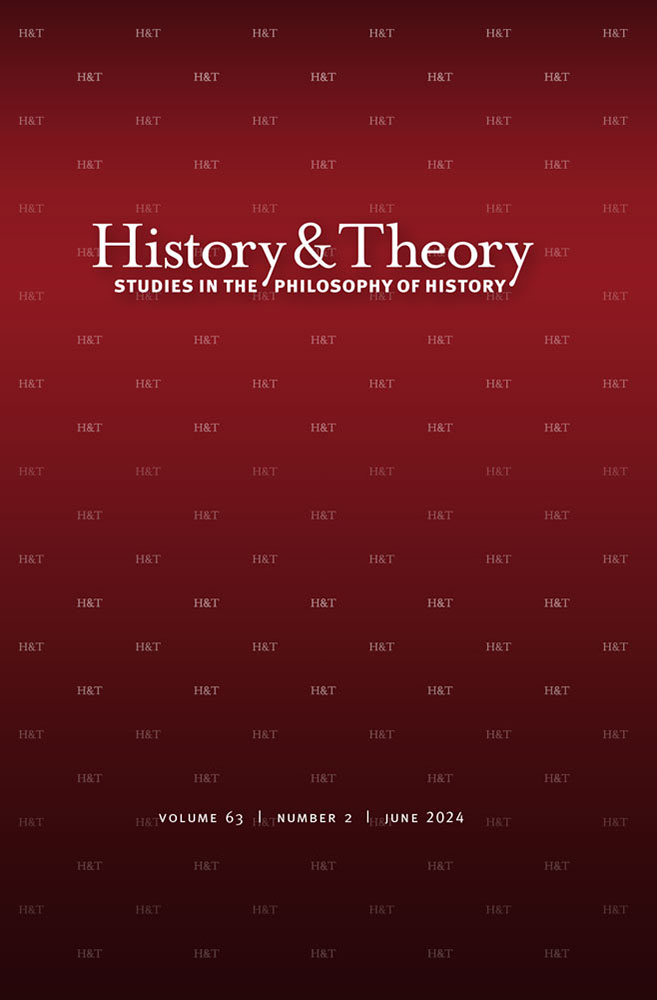
2024-05-23 | Round Table "Publishing theory of history online: a challenge for responsibility?" – Britta Hochkirchen and Bettina Severin-Barboutie in conversation with Shahzad Bashir, María Eugenia Gay, Ethan Kleinberg and Lisa Regazzoni
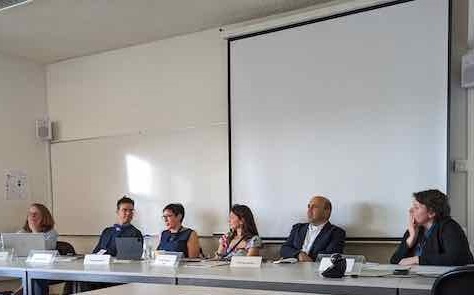
Weitere Informationen | Round Table at the fifth conference of the International Network for Theory of History (INTH) on "History & Responsibility. Doing History in Times of Conflicting Political Demands" in Lisbon, Portugal (May 21-24, 2024). |
Newly published:
Helge Jordheim, Lisa Regazzoni und Chiel van den Akker (eds.)
Journal of the Philosophy of History 17, H. 3 (2023). Special Issue: Reinhart Koselleck in the Anglophone World. URL

2024-04-23 | Lisa Regazzoni: "Die Vergangenheit darf an der Geschichte nicht verarmen. Zu Jörg van Nordens 'Verlust der Vergangenheit'"
My post "Die Vergangenheit darf an der Geschichte nicht verarmen. Zu Jörg van Nordens 'Verlust der Vergangenheit'" has been published on our blog Theory of History at Work.

2024-01-17 | Jörg van Norden: "Verlust der Vergangenheit" with Commentaries by Maja-Lisa Müller & Lisa Regazzoni
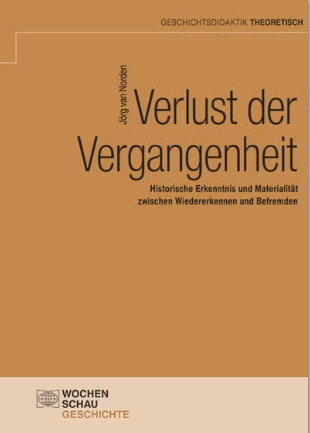
| Presentation of the book Verlust der Vergangenheit. Historische Erkenntnis und Materialität zwischen Wiedererkennen und Befremden by Jörg van Norden with commentaries by Maja-Lisa Müller and Lisa Regazzoni,
as part of the working format "The Theory Center as a Guest of the Colloquium Historical Cultures“ (Bielefeld University), |
2023-11-21 | Round Table "Interdisciplinary Dialogue on Scientific Understanding"
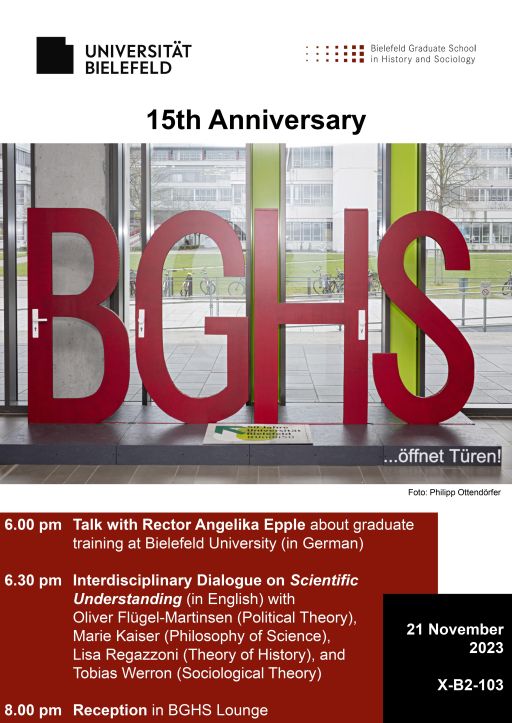
More information here | To celebrate the BGHS's 15th anniversary, there will be an Interdisciplinary Dialogue in which four professors from different disciplines at Bielefeld University will discuss how to achieve what seems to be self-evident: scientific understanding. Oliver Flügel-Martinsen (political theory), Marie Kaiser (philosophy of science), Lisa Regazzoni (theory of history) and Tobias Werron (sociological theory) will be on the podium. Sabine Schäfer, executive manager of the BGHS, will moderate.
|
2023-11-2/3 | "Meta-Historical Categories and Beliefs in the Historical Writing"
Workshop organized on behalf of the Center for Theories in Historical Research, with Ethan Kleinberg and the journal History and Theory, from November, 2nd - 3rd, at Wesleyan University (Middletown, Connecticut).
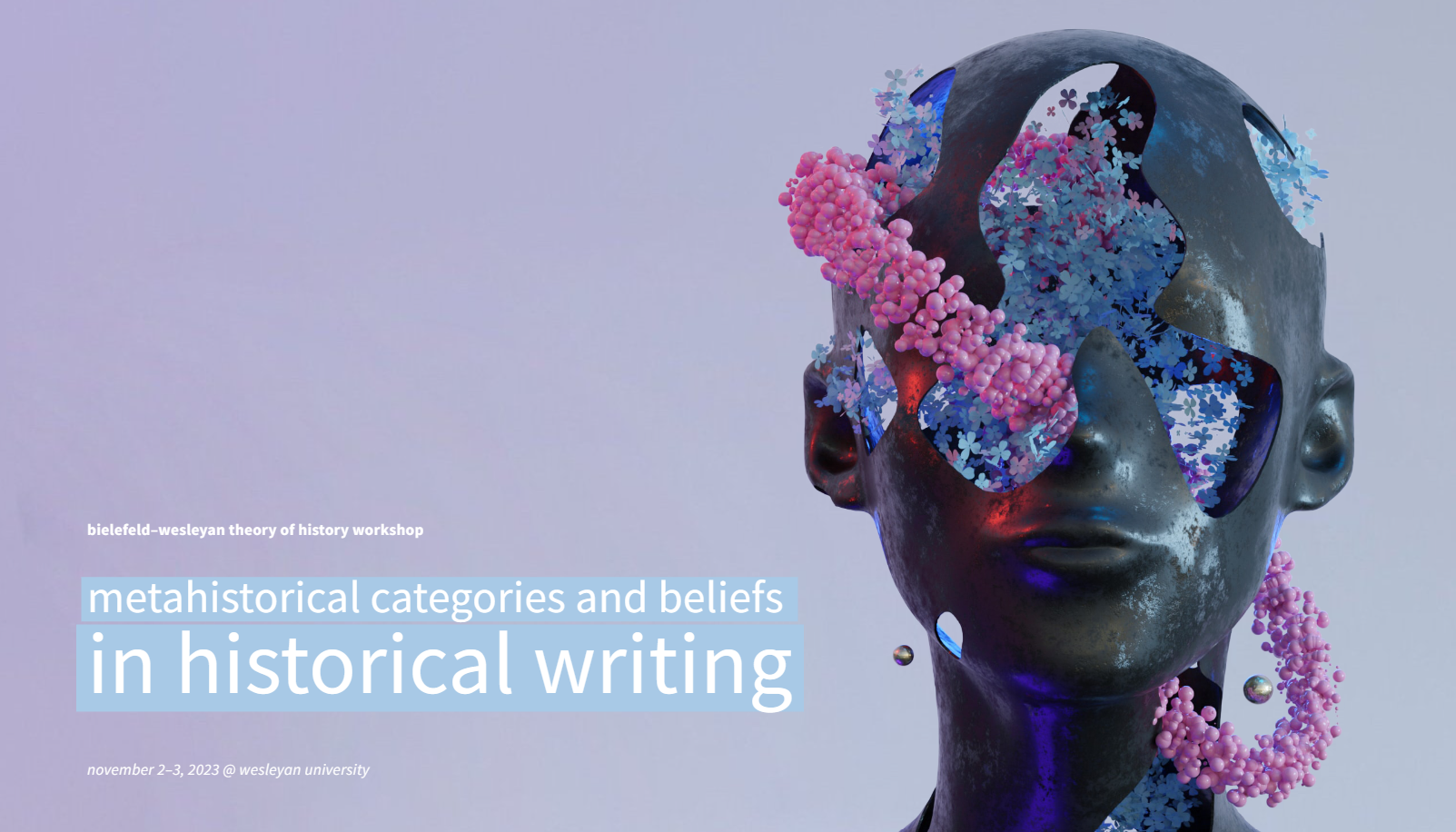
2023-10-10 | Party Review "100. Geburtstag: Mit Koselleck über Koselleck hinausdenken – im ZiF am 22./23. April 2023."
Our post "Party Review - 100. Geburtstag: Mit Koselleck über Koselleck hinausdenken – im ZiF am 22./23. April 2023" has been published on our blog issue KOMPOSITA on our blog Theory of History at Work.
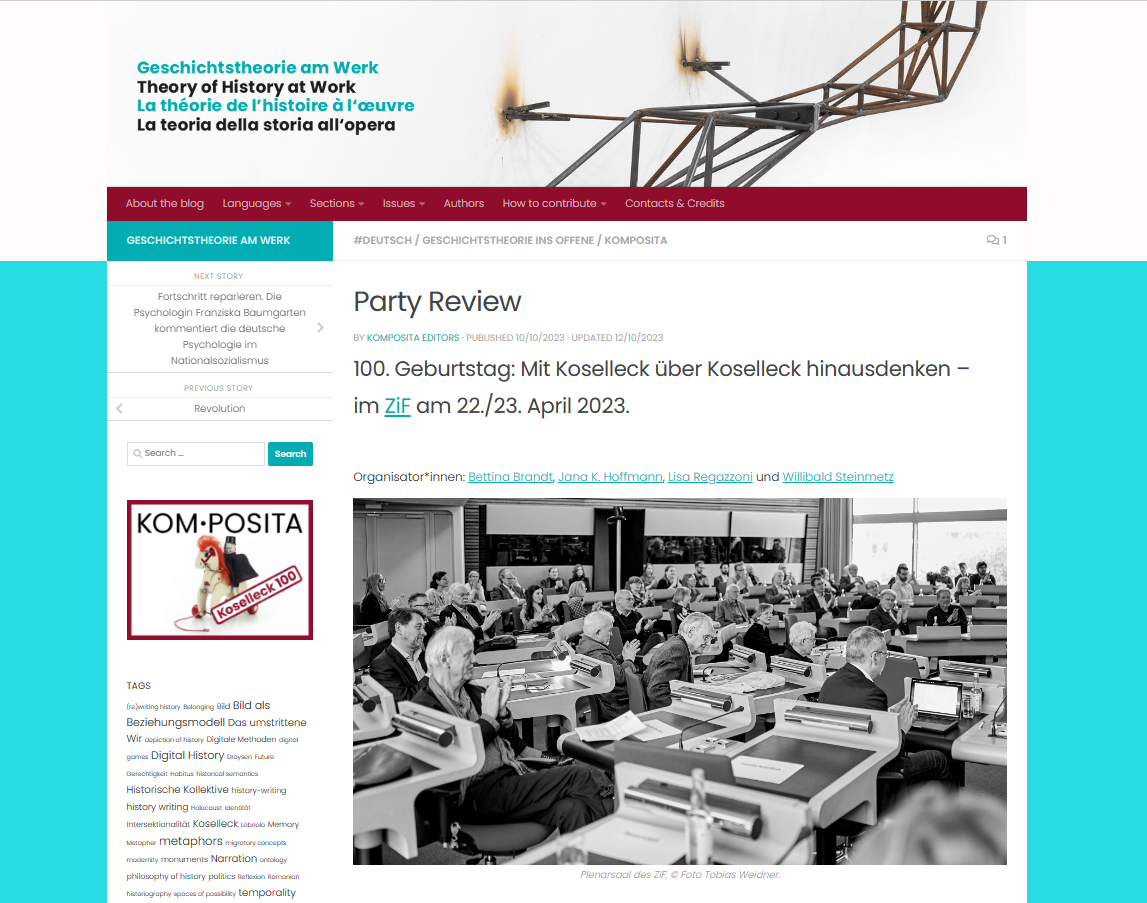
2023-10-12 | Lisa Regazzoni "Geschichtliche Erfahrung in figurativen und materiellen Überformungen: Entwurf einer materiellen Semantik"
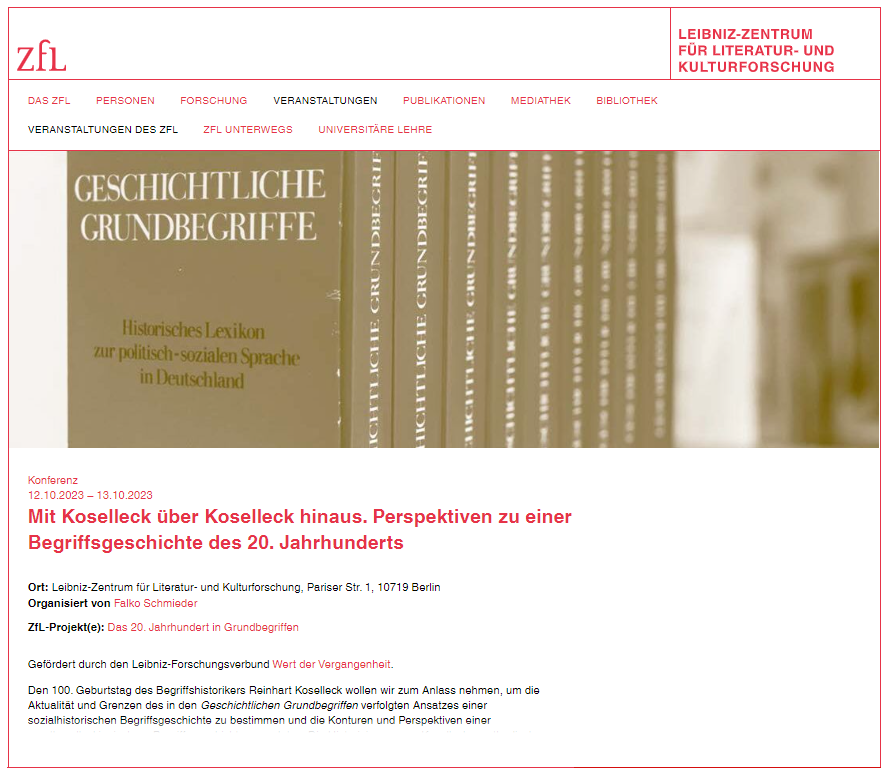
| Talk at the conference "Mit Koselleck über Koselleck hinaus. Perspektiven zu einer Begriffsgeschichte des 20. Jahrhunderts" organized by Falko Schmieder at the Leibniz-Zentrum für Literatur- und Kulturforschung (Berlin) on October 12th and 13th, 2023. More information here |
2023-09-25/29 | Die Vergangenheit erzählen. Traditionen und Entwicklungen in Deutschland und Italien/ Raccontare il passato. Tradizioni e sviluppi in Germania e Italia.
Workshop organized by Prof. Dr. Arndt Brendecke (LMU Munich),
Prof. Dr. Paola Molino (University of Padua), and Prof. Dr. Lisa Regazzoni (Bielefeld University) at Villa Vigoni (Menaggio, Italy) from September 25th to September 29th, 2023.
Italy and Germany have deep narrative traditions that are constitutive of the role of the humanities in society. These distinct traditions are currently facing significant challenges: the dominance of English, the questioning of the printed book, and a shift towards smaller and more ephemeral forms as well as non-written formats (YouTube, podcasts, etc.). This workshop addressed these challenges while deliberately placing the art of storytelling at its centre. It discussed the conditions and effects of good storytelling, as well as changes in its forms.
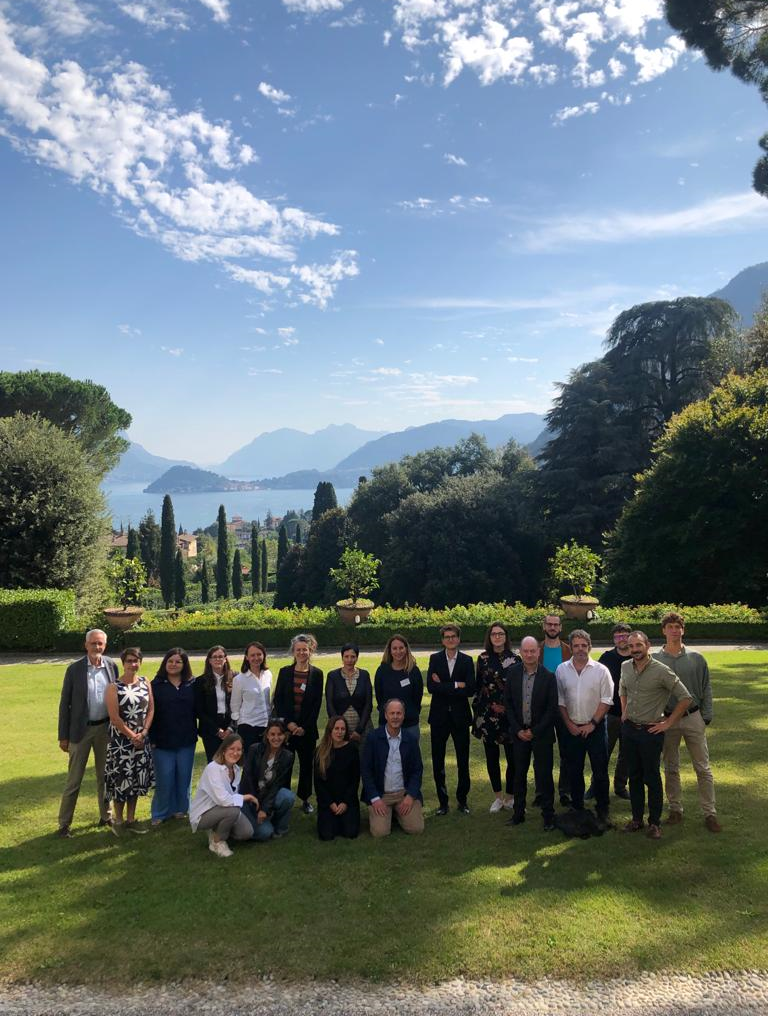
Participants in the workshop „Die Vergangenheit erzählen“. © Lisa Regazzoni
2023-09-08/09 | Lisa Regazzoni and Ingrid Mann: Workshop "Intersecting Pasts - Collaborative Working at History’s Fuzzy Boundaries"
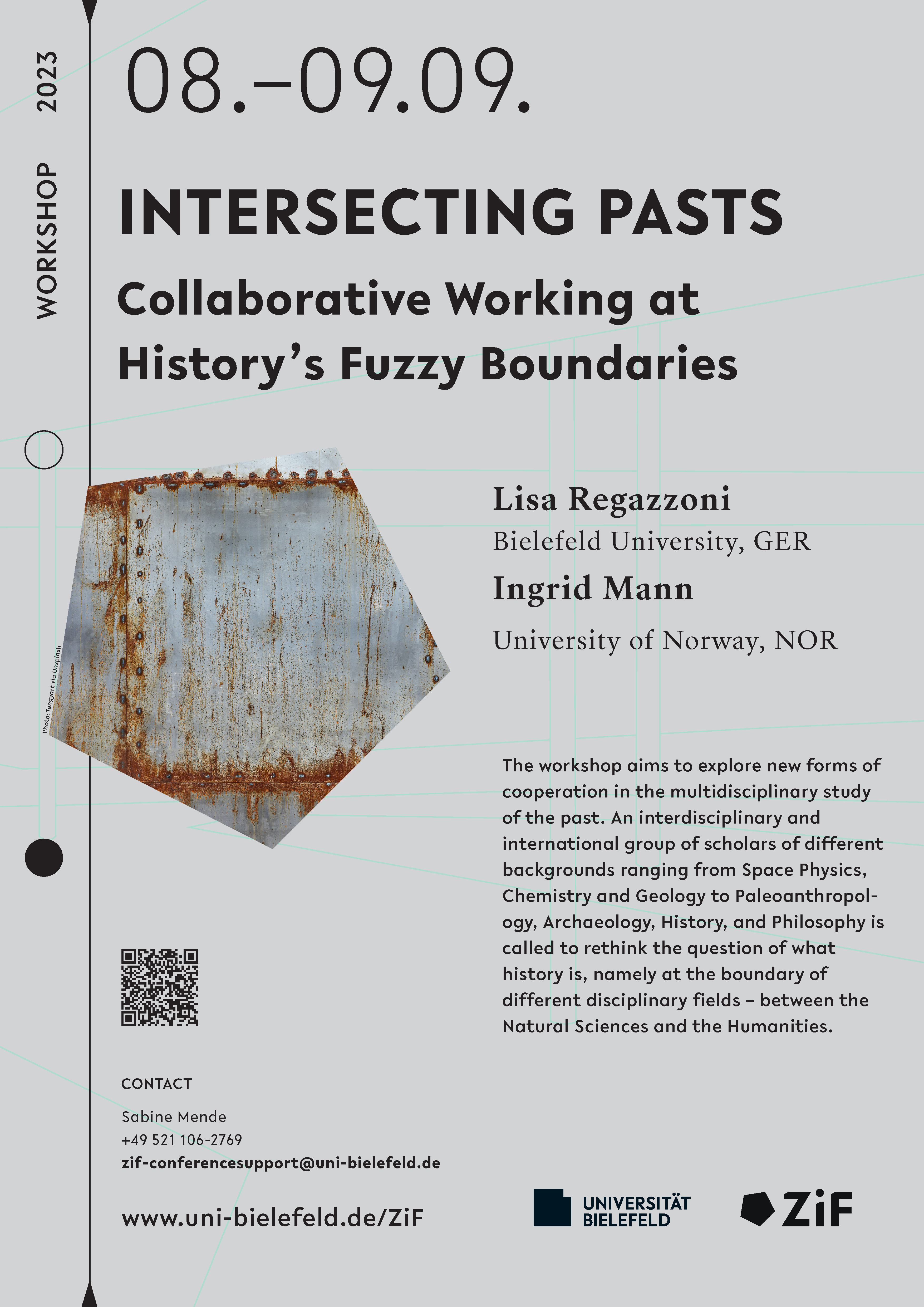
| Workshop organized by Lisa Regazzoni and Ingrid Mann at the Zif (Center for Interdisciplinary Research) at University Bielefeld. More information here |
2023-06-26 | Lisa Regazzoni: "A la recherche de nouvelles pistes pour l'étude historique des communautés"
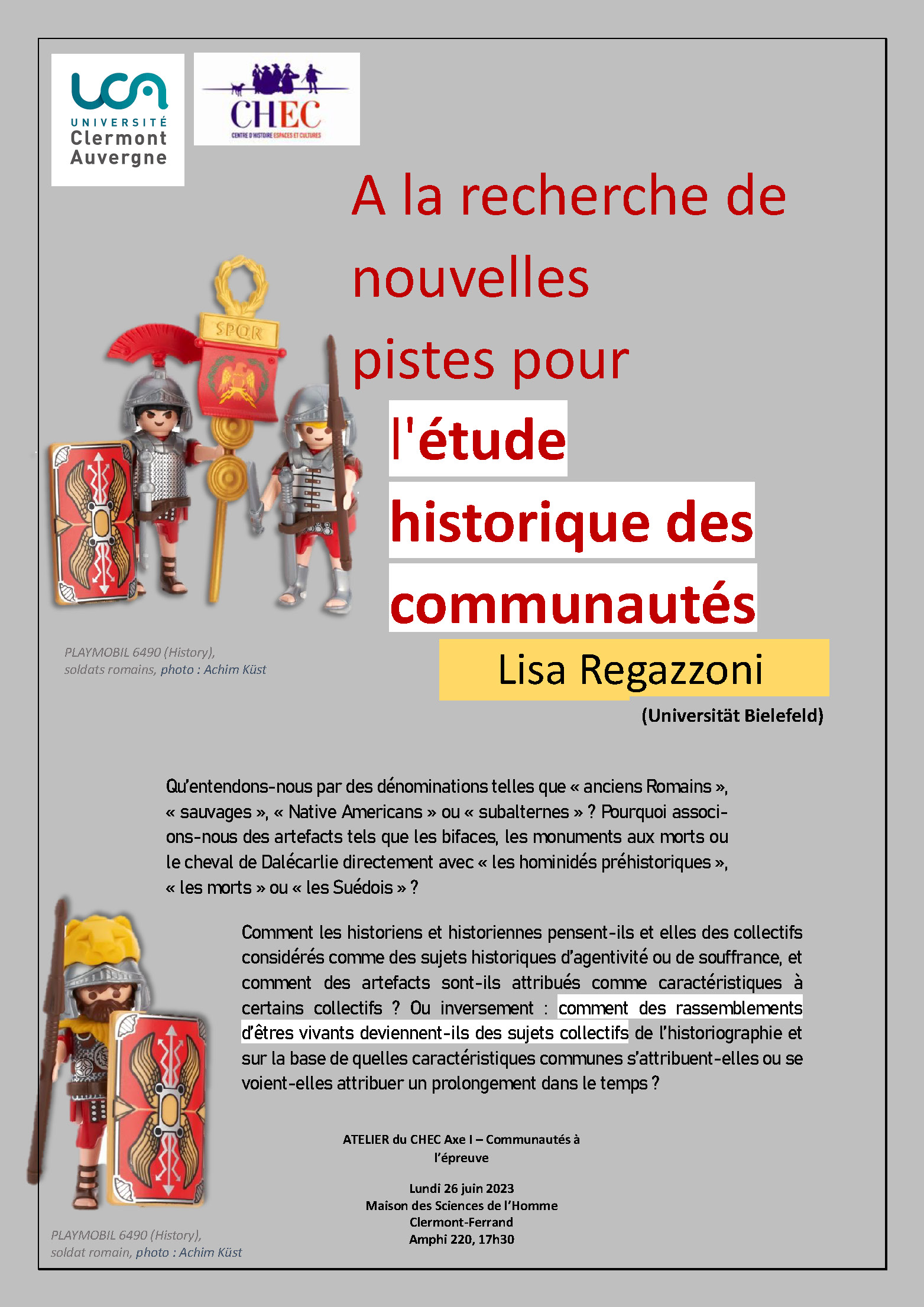
| Talk at the University of Clermont Auvergne - Maison des Sciences de l'Homme, on June 26th, 2023, 5:30pm (CEST). More information here |
2023-05-23/24 | Britta Hochkirchen and Lisa Regazzoni: Workshop „Laboratory in the Theory of History“
Workshop and theory class organized by the Center for Theories in Historical Research in cooperation with the Centre for Philosophical Studies of History (University of Oulu).
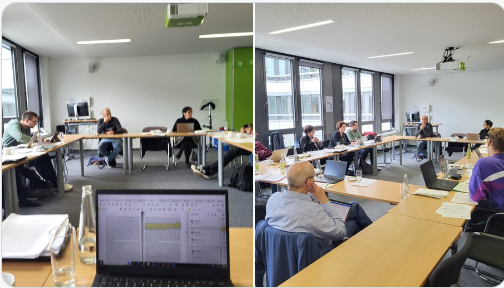
More information here
What practices characterize historiographical writing? How are meaningful complexes and historical significance constructed in historiographical texts and to what extent are these confirmed by evidence and existing historiographical discourses? What role do the different writing modes, such as description, “genetic-narrative” vs. “retrospective-investigative” narration or source- or plausibility-based reasoning, play in this process? How are these modes of writing connected?
The international two-day Theory Class will explore how historians approach evidence, contextualization and presentation in terms of the structure and purpose of each step in their line of argument. Against the background of this ‘dissecting’ analysis, it will be asked what basic theoretical models and ideas of “history” and “historical significance” underlie the individual approaches. Here, key historical terms (such as context, source, epoch) and practices (contextualizing, proof, presentation) will be examined with regard to their historico-theoretical prerequisites.
With impulse lectures by Donald Bloxham (University of Edinburgh) and Wulf Kansteiner (Aarhus University).Course Management: Britta Hochkirchen (Friedrich-Schiller-University Jena) and Lisa Regazzoni.
2023-05-05 | Lisa Regazzoni: "Figurative und materielle Überformungen historischer Erfahrung als Überlebensstrategien im Leben und Denken Reinhart Kosellecks"
Talk at the conference "Iconology: Implications and Scope of the Visual Turn. From Panofsky to Koselleck“,
at the Ecole Normale Supérieure (Paris), on May 5th, 2023.
Newly published:
Lisa Regazzoni (ed.)
Im Zwischenraum der Dinge. Eine Annäherung an die Figurensammlung Reinhart Kosellecks. Bielefeld: transcript, 2023. DOI
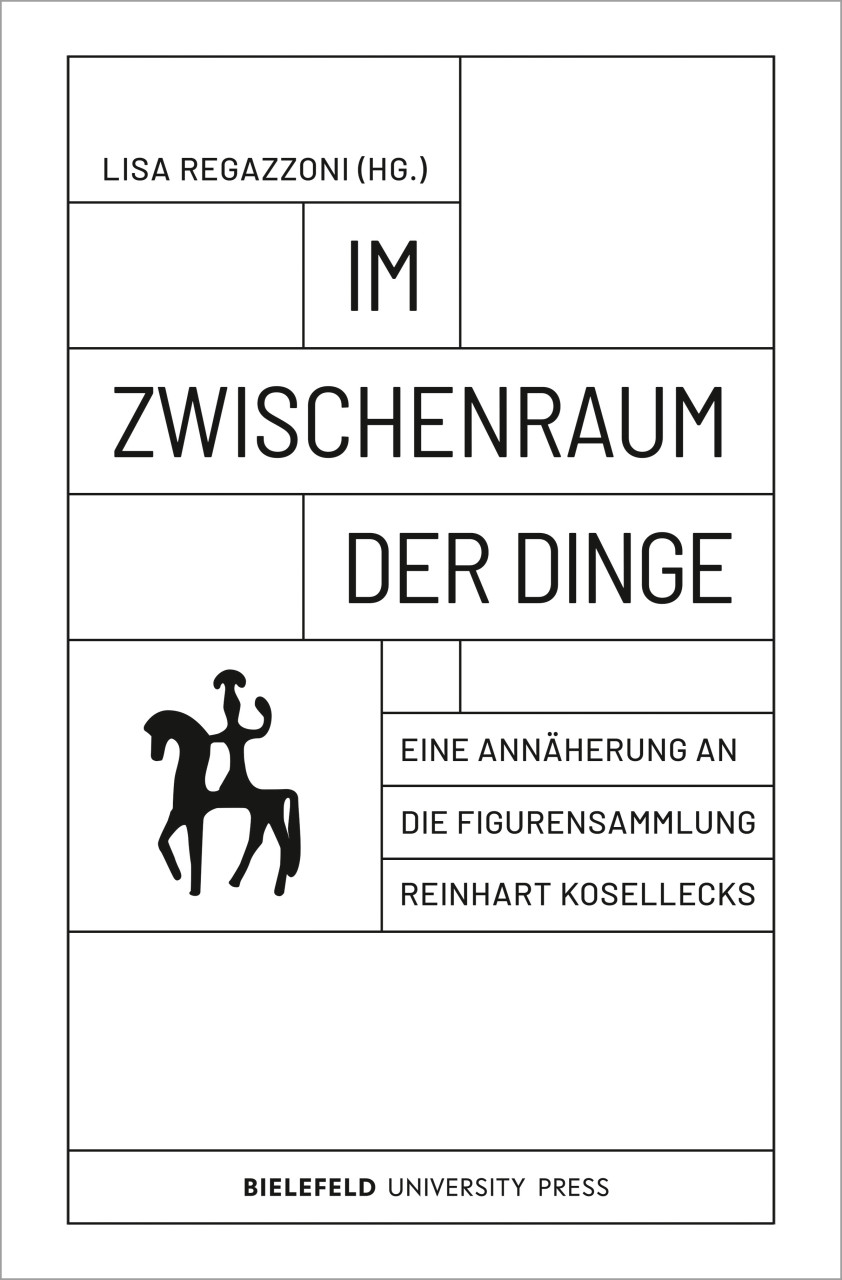
2023-04-22 | 100. Geburtstag: Mit Koselleck über Koselleck hinausdenken
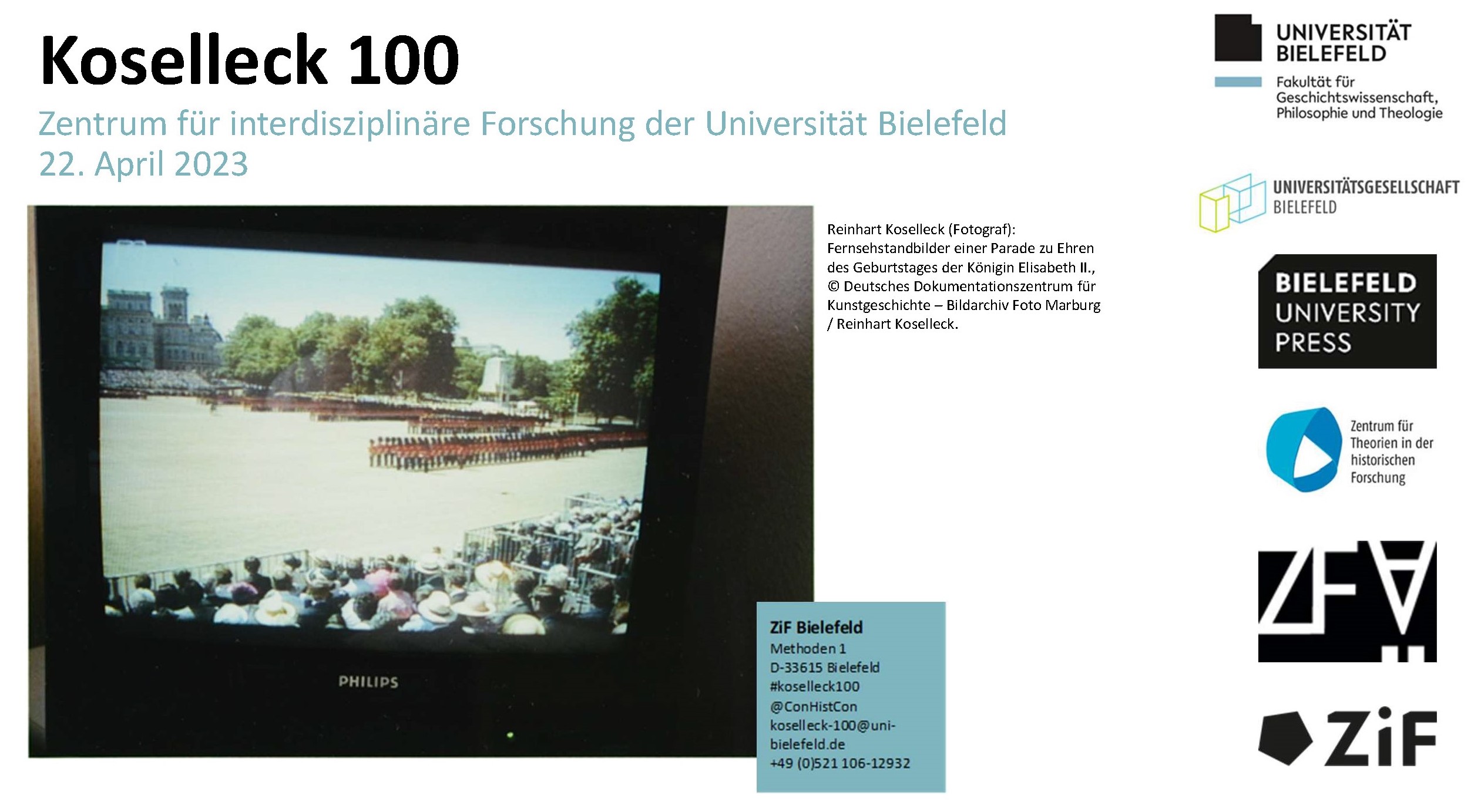
Am 23. April 2023 wäre der Bielefelder Historiker Reinhart Koselleck 100 Jahre alt geworden. Die Abteilung Geschichtswissenschaft und das Zentrum für Theorien in der historischen Forschung der Universität Bielefeld richten am Samstag, 22. April, eine Veranstaltung zum 100. Geburtstag Reinhart Kosellecks mit geladenen Gästen im ZiF aus.
Weitere Informationen
Begriffsgeschichte, Historik, politischer Totenkult, politische Ikonologie – hinter diesen bekannten Themen seines Werkes fächert sich Kosellecks Denken vielfach auf, formuliert in einer individuellen analytischen Begrifflichkeit, die intellektuelle Spielräume öffnet. Historische Zeit und ihre Paradoxien, körperlich-sinnliche Wahrnehmung als Bedingung multiperspektivischer (Konflikt-)Geschichten, das spannungsvolle Verhältnis von individueller Erfahrung und kollektiver Erinnerung sind nur einige der Aspekte, die in der internationalen kultur- und sozialhistorischen Forschung von aktuellem Interesse sind.
Die Abteilung Geschichtswissenschaft und das Zentrum für Theorien in der historischen Forschung der Universität Bielefeld nehmen den 100. Geburtstag Reinhart Kosellecks zum Anlass, um im Rahmen einer Feier aktuelle Projekte und Publikationen vorzustellen, die sich der vielfältigen intellektuellen Neugierde Kosellecks widmen, nach dem Motto: „Mit Koselleck über Koselleck hinausdenken“. Nicht nur der Geschichtstheoretiker, Begriffs- und Bildhistoriker, sondern auch der noch zu entdeckende Sammler und Karikaturist Reinhart Koselleck wird vorgestellt.
Reinhart Koselleck (1923 – 2006) gehörte nach seiner Habilitation an der Universität Heidelberg im Jahre 1965 zunächst dem Wissenschaftlichen Beirat und ab 1968 dem Gründungsausschuss der Universität Bielefeld an, während er Professuren an den Universitäten Bochum und Heidelberg bekleidete. Von 1973 bis 1988 war er Professor für Theorie der Geschichte an der geschichtswissenschaftlichen Fakultät der Universität Bielefeld, an deren Einrichtung er maßgeblichen Anteil hatte. Auch das Bielefelder Zentrum für interdisziplinäre Forschung prägte Reinhart Koselleck als geschäftsführender Direktor 1974/75 und als Mitglied des Wissenschaftlichen Beirates von 1979 bis 1990.
Organisator:innen: Bettina Brandt, Jana Hoffmann, Lisa Regazzoni, Willibald Steinmetz
2023-04-13 | Moira Pérez and Lisa Regazzoni: "Roundtable: What are we doing with Collective Identity?"
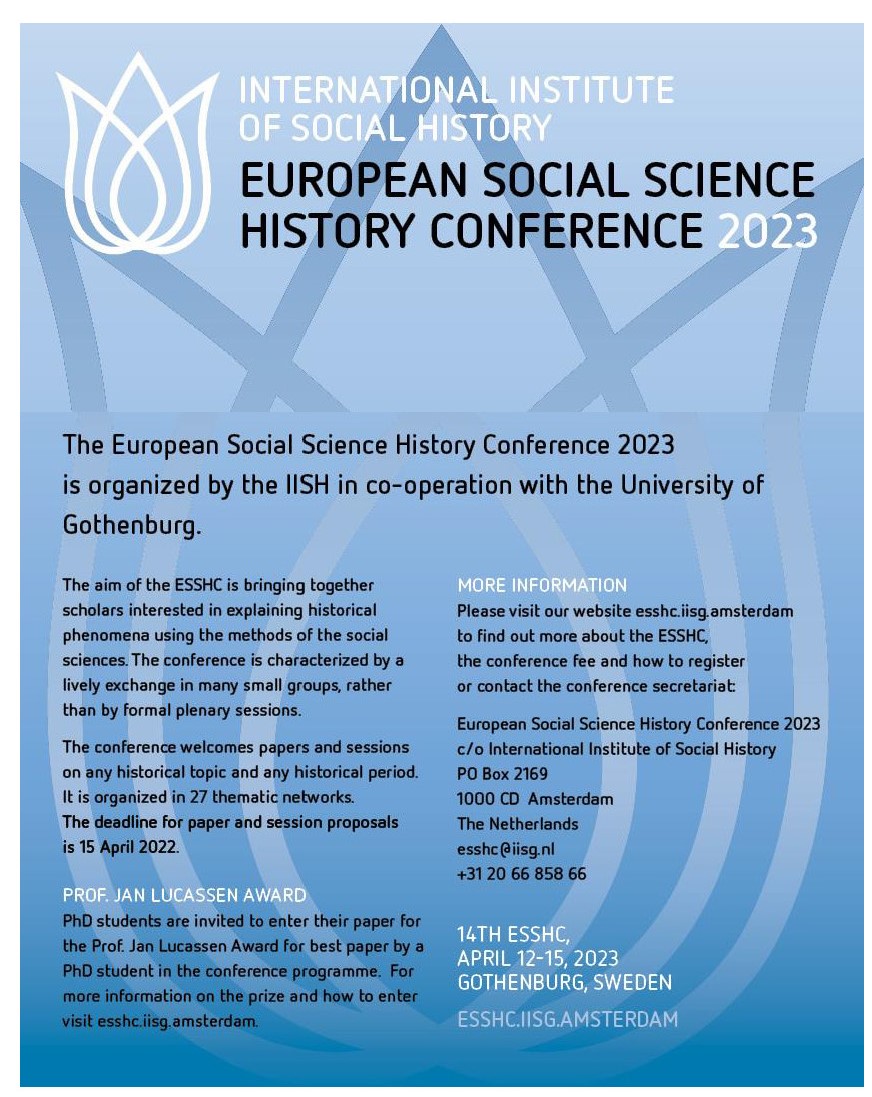
More information here | Round Table organized by Moira Pérez and Lisa Regazzoni at the European Social Science History Conference (ESSHC) in Gothenburg (Sweden), |
2023-03-14 | Lisa Regazzoni: "The Gallic Past and French Historical Research in the 18th and Early 19th Century"
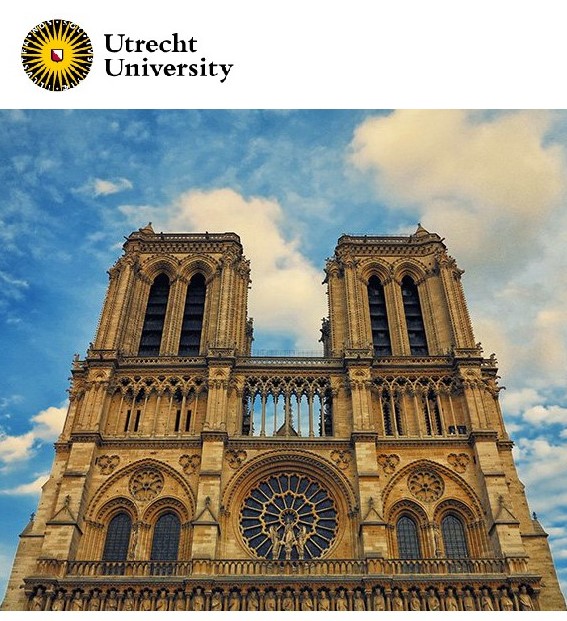
| Talk organized by the research group "Global Intellectual History" More information here |
2023-03-07 | Lisa Regazzoni: "Outline of a Theory of Historical Intentionality - Thing by Thing"
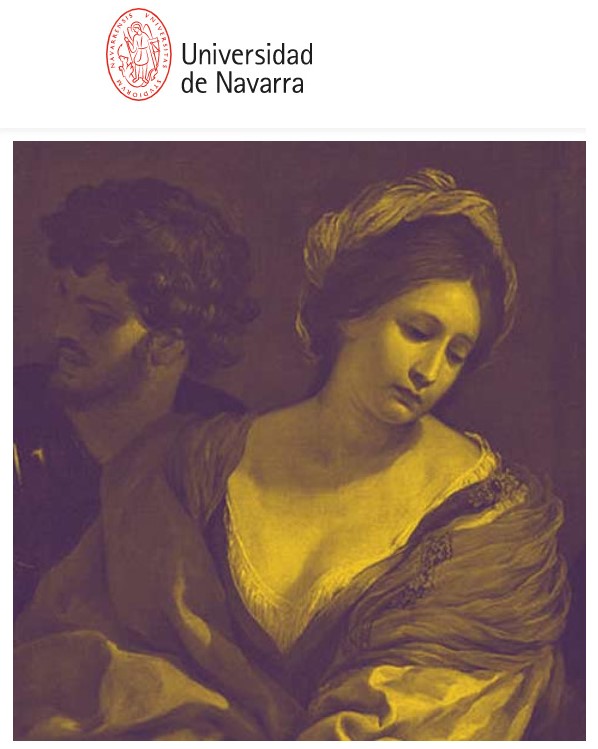
| Talk at the Seminar organized by the research group "Religion and Civil Society" (University of Navarra), More information here |
2023-24-01 | Blog-issue KOMPOSITA
A fortnightly blog issue publication commences from
January 24 2023:
KOMPOSITA: Contributions to Reinhart Koselleck’s “Space of Resonance” edited by Bettina Brandt, Jonathon Catlin, Jana K. Hoffmann and Lisa Regazzoni.
For the next few months, you can read on the blog Geschichtstheorie am Werk, contributions about insights and resonances in Koselleck’s work with an open invitation to expound his thoughts.
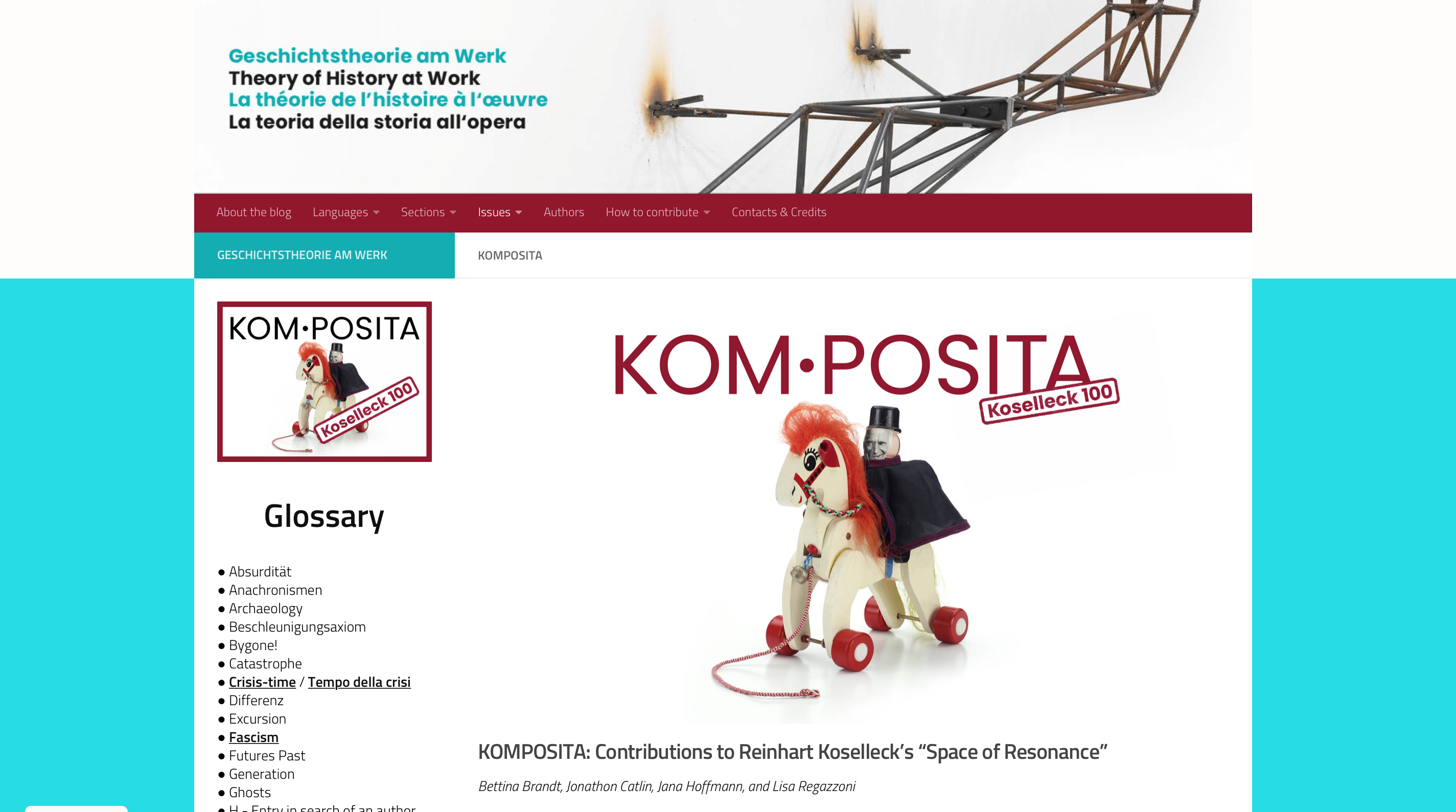
2022-11-09 | Comment les Gaulois sont-ils devenus nos ancêtres? LES DÉBATS DU CAK - SAISON 18, SÉANCE 2 (EHESS, Paris)
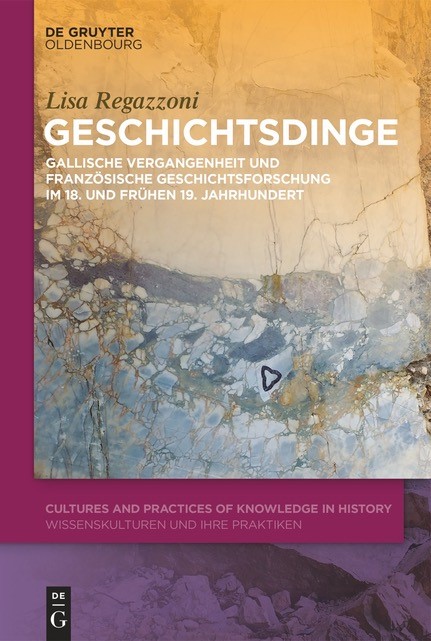
| Presentation of the book Geschichtsdinge. Gallische Vergangenheit und französische Geschichtsforschung im 18. und frühen 19. Jahrhundert with the author Lisa Regazzoni, Tristan Coignard (Université Bordeaux Montaigne) and Laurent Olivier (Musée d'Archéologie nationale et domaine national de Saint-Germain-en-Laye), at the École des hautes études en sciences sociales (EHESS) in Paris, on November 9th, 2022. |
More information here
2022-10-20 | Lisa Regazzoni: "Sketching a Theory of historical Intentionality – Thing by Thing"
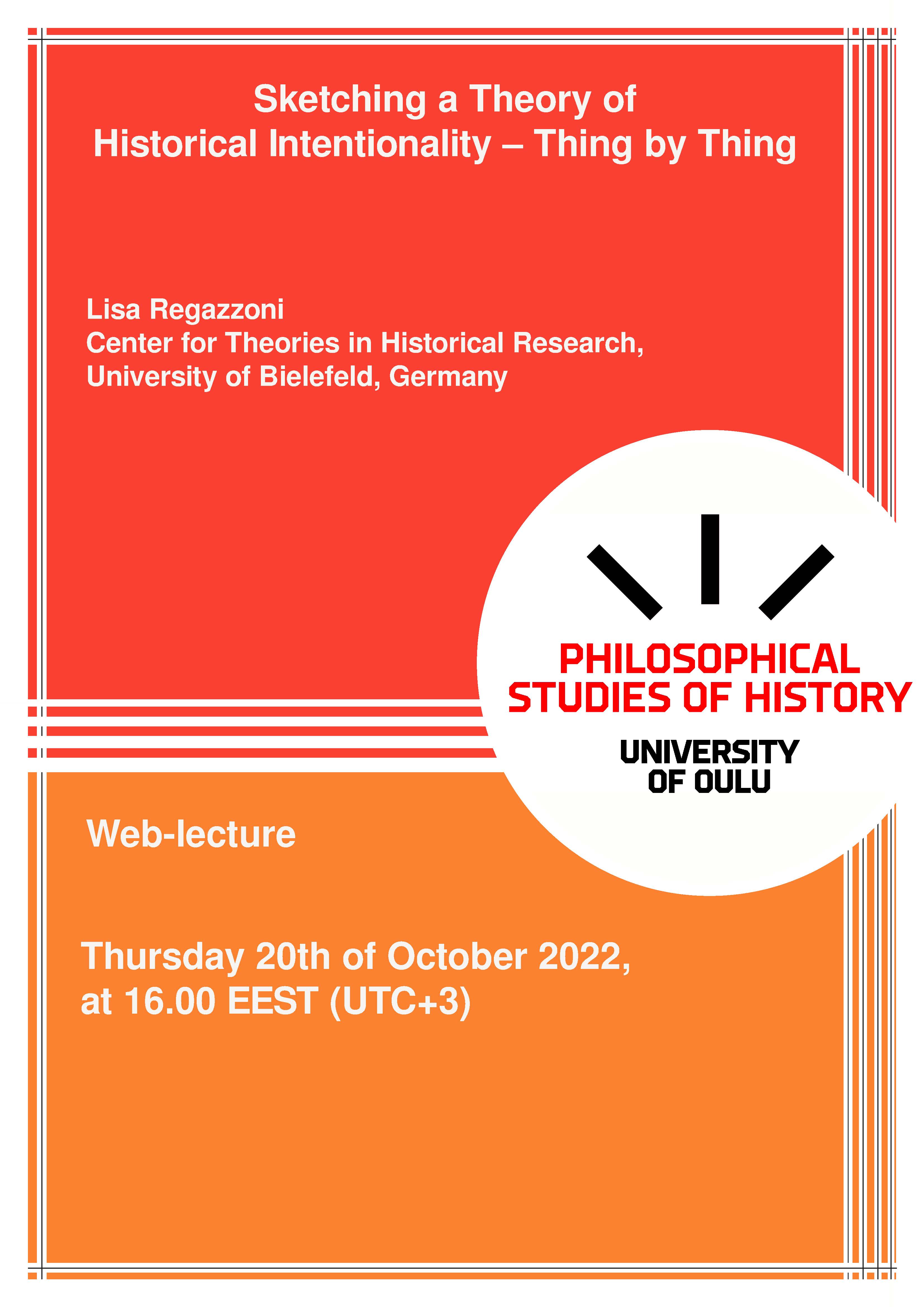
| Talk at the Center for Philosophical Studies of History (University of Oulu), |
2022-09-15 | Lisa Regazzoni: "The Elementary Particles of Historicity"
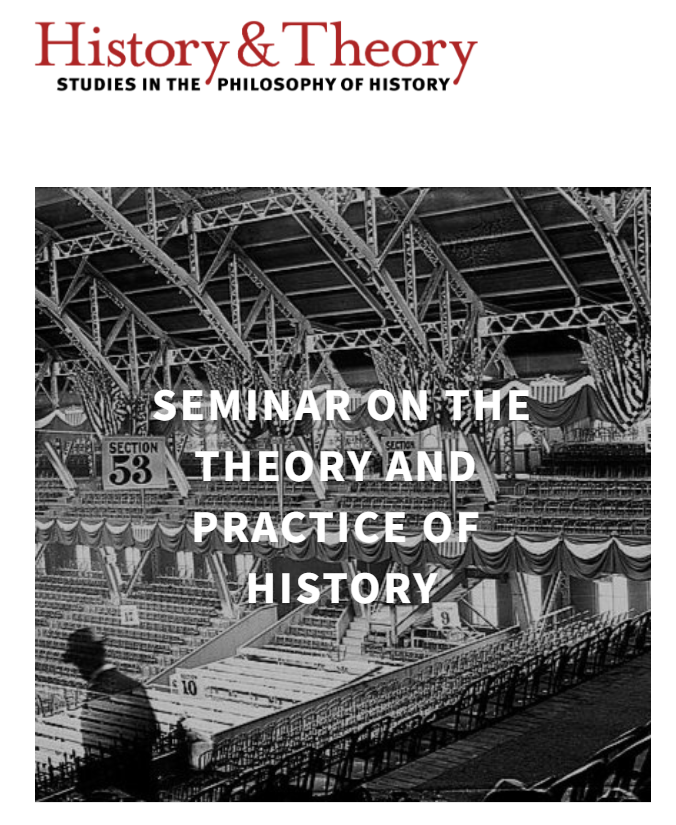
| Seminar at the seminar series on the Theory and Practice of History, at Wesleyan University (USA), More information here |
2022-07-25 | Lisa Regazzoni "Stones and Other Stuff: A Matter of Concern to Theory of History"
My post "Stones and Other Stuff: A Matter of Concern to Theory of History" has been published on the History and Theory's blog
One More Thing...
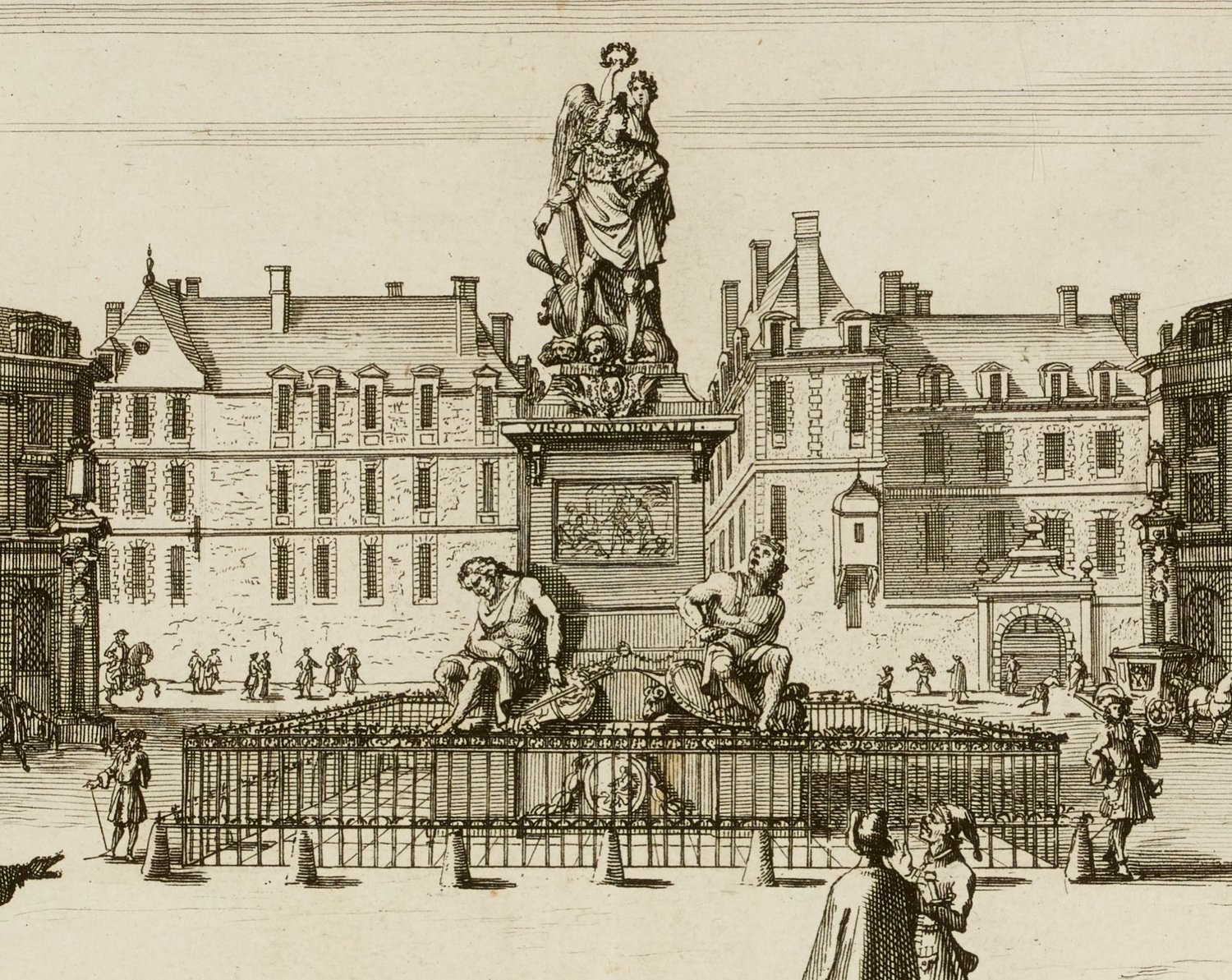
What does a statue of Louis XIV in an engraving published in 1689 have in common with stone artifacts in an engraving published in 1740?
The designation.In the initial decades of the eighteenth century, both species of artifacts were indeed referred to as “monuments.” Under close scrutiny, this name sharing even morphs, surprisingly, into a paradox. Illuminated, the latter acts as a prism, laying bare a spectrum of questions and reflections on history as historiography: on its nature and function as well as on its epistemic assumptions and values, all of which, as I argue in my article, continue to play latent roles in historiography today.
2022-06-28 | Lisa Regazzoni: "And If History Were to Turn Its Back on the Future? A Thought-provoking Interjection"
My post "And If History Were to Turn Its Back on the Future? A Thought-provoking Interjection" has been published on our blog Theory of History at Work.
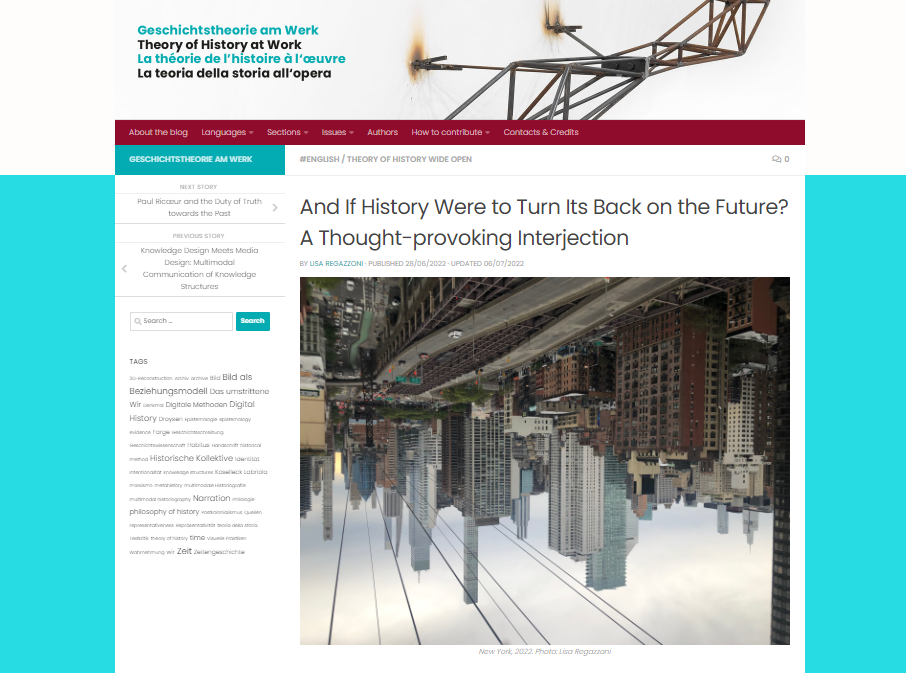
“How do we want to write history in the future?” Invited to a roundtable to provide input in response to this apparently straightforward question, I had a sense of unease and quite a few difficulties. Not because I have no vision of how I would like to write history or because I’m incapable of imagining how history could or should be written in the future, assuming history is still told or represented in written form. My unease comes from having to link ideas such as “want to”, “writing history” and “future” in the same sentence.
Newly Published:
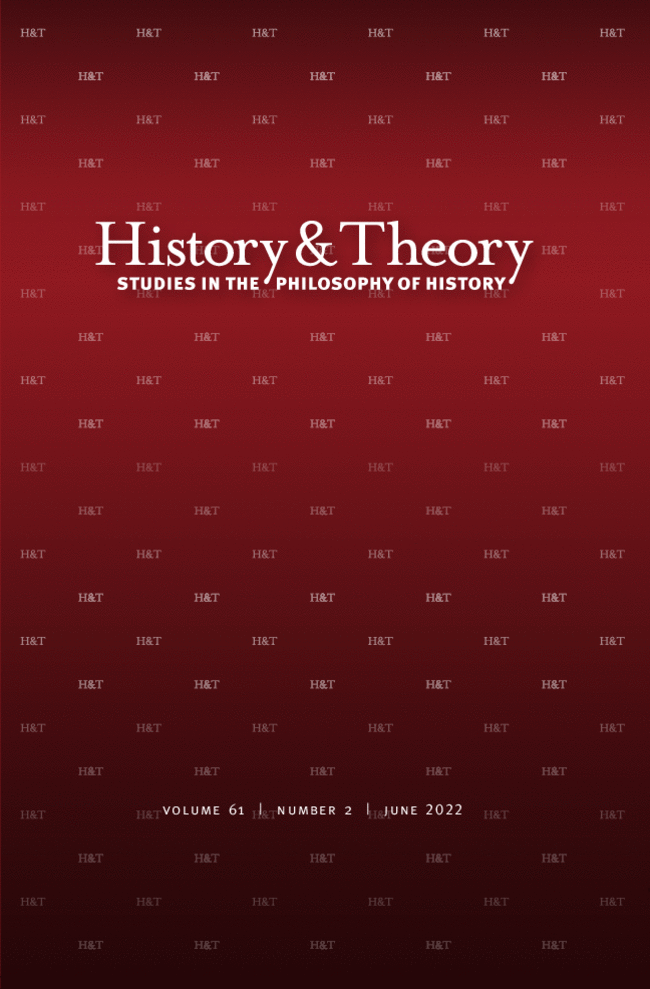
| Lisa Regazzoni, Unintentional monuments, or the materializing of an open past, in: History & Theory 61 2 (June 2022), pp. 242–268. DOI Abstract This article examines the emergence of a new epistemic value that was attributed to remnants of the past during the broad debate on historical evidence in the late seventeenth and eighteenth centuries: the unintentionality of the testimony. |
Read more
Beginning in the early modern period, growing awareness of the partiality of historical literacy narratives regarded as intentional testimonies as well as growing interest in nonwritten pasts have led to the consideration of other kinds of relics, which have been seen as unwitting and indirect carriers of information about the past. Material and iconographic remains, languages and oral traditions, costumes, and superstitious practices gained currency as “neutral” and “authentic” testimonies of times past. This process is accessed by analyzing the historical evidence par excellence in eighteenth-century France: the monument as material and immaterial remains. Over the course of this period, evidence underwent impressive semantic enhancement and became a polysemic epistemological object. At the time, the term “monument” referred to an intentional mark designed for and entrusted to the future and to unwitting or involuntary evidence of the past, evidence that was later invested with historical value not originally intended by its maker. Although the nineteenth century saw the term “monument” lose its meaning as an unwitting trace of the past, what has survived is the epistemic value of an unintentionality of testimonies, albeit under other conceptual guises such as “remnants,” “witnesses in spite of themselves,” “traces,” and “clues.” What, then, is the usefulness of still imagining unintentionality today for the practice of research and for historical understanding?
2022-04-27 | Lisa Regazzoni: "The intentionality of evidence and the elementary particles of historicity"
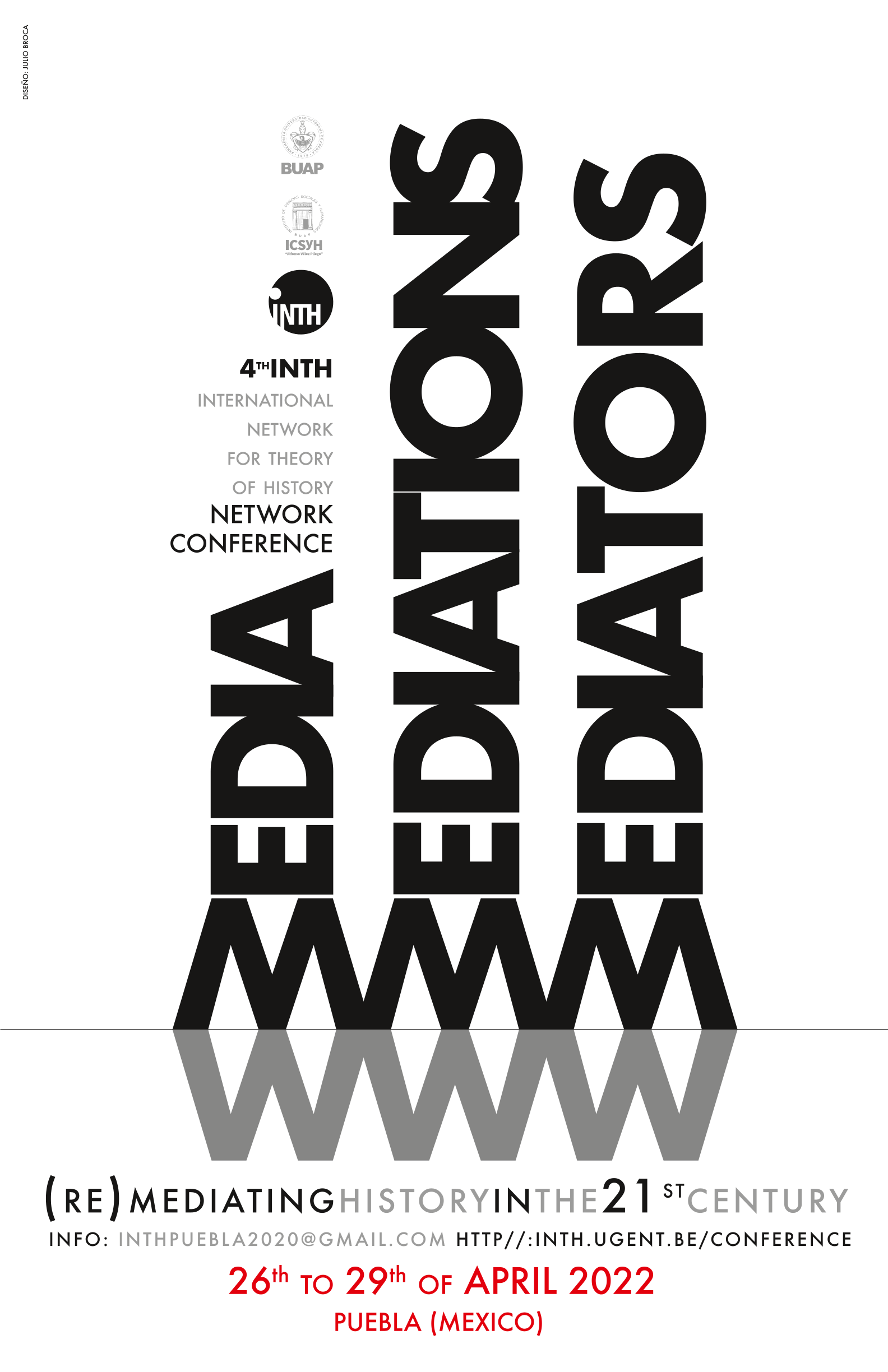
| Talk at the fourth International Network for Theory of History (INTH) Conference on "Media, Mediations and Mediators: (Re) Mediating History in the 21st Century" in Puebla (Mexico), More information here |
2022-04-26 | Lisa Regazzoni: "Den Vergangenheiten auf der Spur: Abriss einer Theorie der Intentionalität – Den Dingen entlang"
My post "Den Vergangenheiten auf der Spur: Abriss einer Theorie der Intentionalität – Den Dingen entlang" has been published on our blog Theory of History at Work.
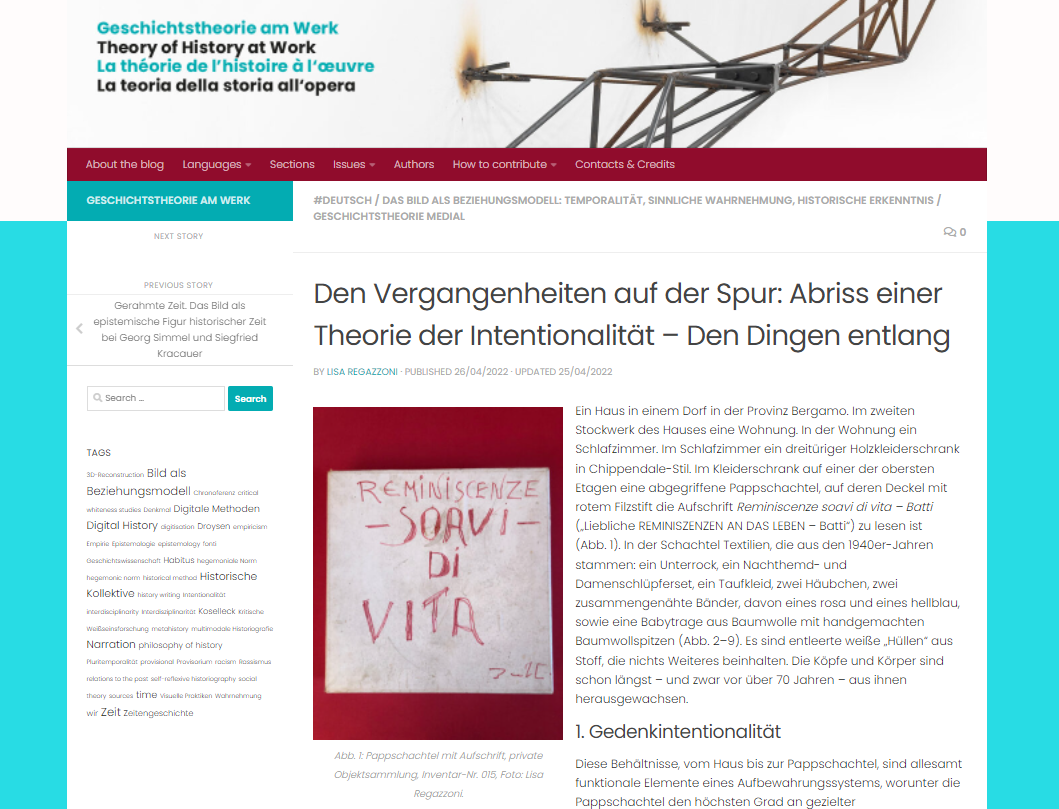
Newly Published:
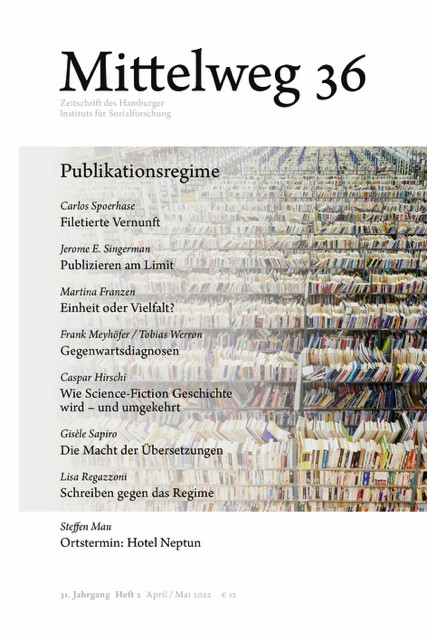
| Lisa Regazzoni, Schreiben gegen das Regime. Bloggen als subversive Praxis?, in: Mittelweg 36 2 (April/May 2022), pp. 39–47. More information here |
2022-03-28 | Lisa Regazzoni "How Can a Gathering of Things Be Transformed into a Scientific Collection? Experimenting with Reinhart Koselleck’s Material Estate"
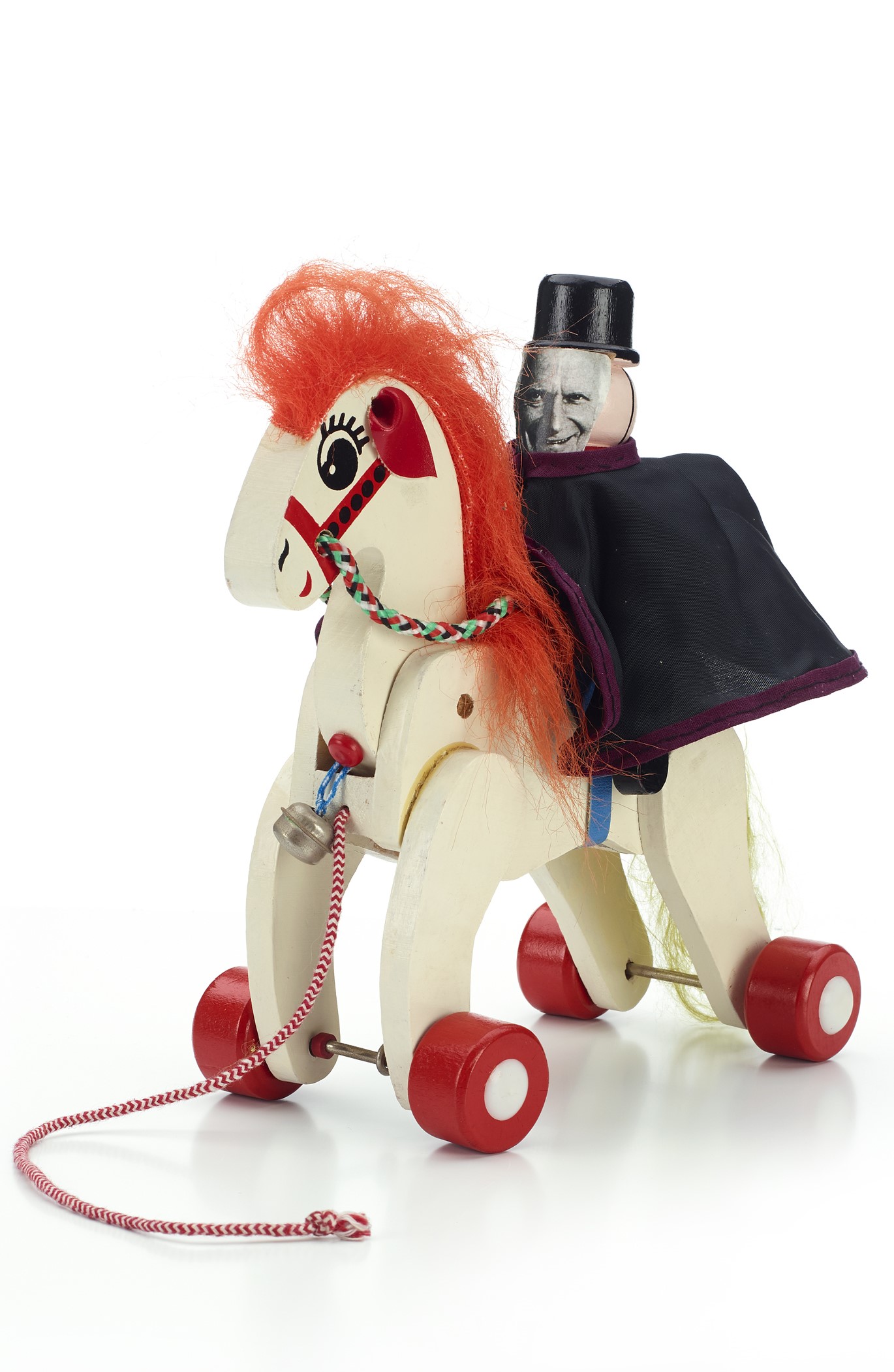
| Talk at the Bard Graduate Center (New York), on March 28th, 2022, 12:15 pmHorse figurines made of textile, wood, or glass from different regions of the world, toy soldiers made of pewter, souvenir figurines—for example, of Marx, Atatürk or Mao—and much more: this assortment of seemingly disparate things lay scattered for years on the bookshelves and any free space in the study of Reinhart Koselleck (1923–2006)...More information here |
Please send participation requests by mail to academicevents@bgc.bard.edu
2022-01-11 | Lisa Regazzoni "In search of new approaches to the historical investigation of collectives"
My post "Auf der Suche nach neuen Wegen zur historischen Erforschung von Kollektiven" (engl.: In search of new approaches to the historical investigation of collectives) has been published on our blog Theory of History at Work.
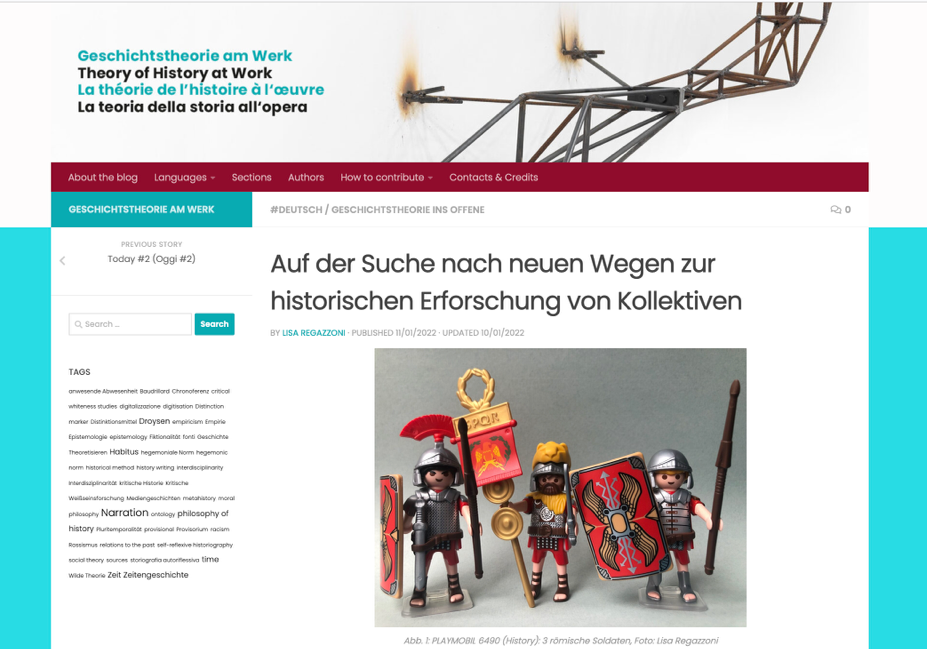
"What is our understanding of the nominal "Ancient Romans," "savages," or "Native Americans," or the "Subaltern"? Why are we associating artifacts like war memorials or a Dalecarlian horse (Img. 1) intuitively with "prehistorical hominids," "the ones Fallen," respectively "Swedes"?..."
2021-12-14 | Lisa Regazzoni "History Unbounded How do we want to play it?" in the panel discussion How do we want to write history in the future?
A panel discussion with Ethan Kleinberg, Stefan Berger, Lucian Hölscher, Chris Lorenz, Kristin Platt and Lisa Regazzoni on
"How do we want to write history in the futre",
on December 14th, 2021, 16-19:00.
This event is organized by Stefan Berger,
at the Institute for Social Movement in Bochum/Germany.
More informationen here
2021-12-08 | Ethan Kleinberg and Achim Landwehr:
Domino Talk Series "Emmanuel Levinas’s Talmudic Turn: Philosophy and Jewish Thought"
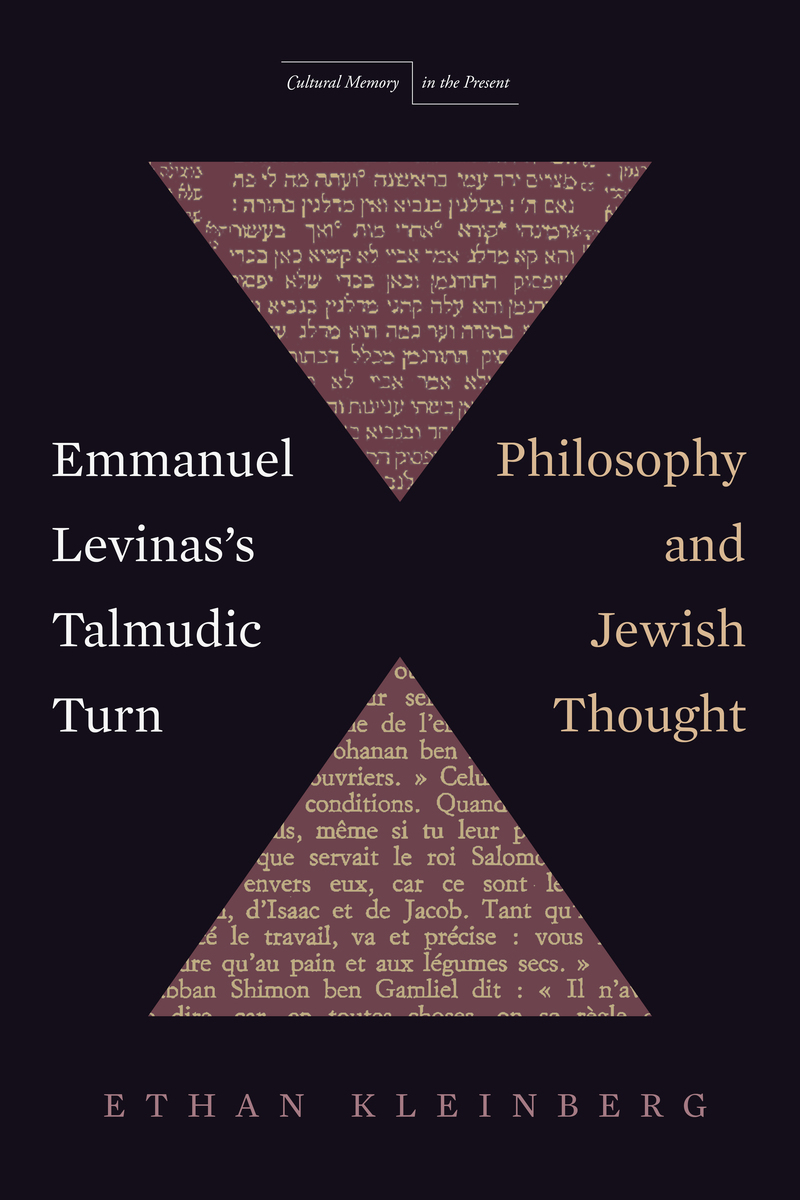
| The third iteration of the Center for Theories in Historical Research’s domino talk series,
Please send participation requests by mail to theoriezentrale-geschichte@uni-bielefeld.de
|
2021-11-23 | Lisa Regazzoni "Theorizing History or How to Rethink Theory of History through Questions"
My post "Theorizing History or How to Rethink Theory of History through Questions" has been published in our blog Theory of History at Work.
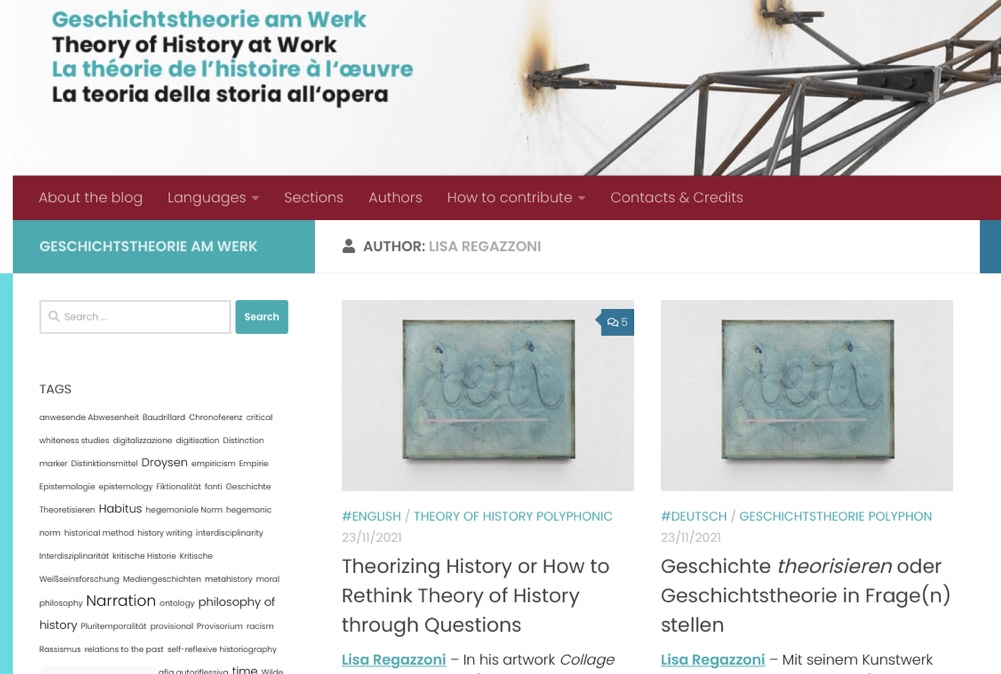
"In his artwork Collage oulʼâge de la colle (Collage or the Age of Paste), Man Ray confronts us with the question of when historical ages and thus caesurae are marked and along what criteria. What if paste were to be raised to a category of historical time structuring analogous to the stone, iron or bronze age? After all, its technical relevance is immense, and not only for members of the avant-garde in the arts. Is Man Ray doing “Theory of history” in his artwork?"
Newly Published:
My article "The impossible monument of experience: a story that never ends“ has just been published in the volume Die Vergangenheit im Begriff (ed. by Jeffrey Andrew Barash, Christophe Bouton, Servanne Jollivet).
Read more
...who, faced with the need to understand the causes of defeat, may be able to elaborate new methodological approaches to the past. The following reflections represent an attempt to reread Koselleck’s approach to the political monument cult as one of several methodological solutions, including a historical-conceptual interpretation, that lead to an understanding of the fundamental »foreign« experience that is modernity and its outcome in the twentieth century. Hence Koselleck treats monuments both as »indicators« of the transformation to modernity (of which he has foreign experience) and as an expression of the memorial politics of the recent past (which he experienced primarily). It is precisely this analysis of twentieth century war memorials that generates a rethinking not only of the physiognomy of modernity but also of the task of history, ultimately forced to pass the baton to art in reworking the past.
2021-10-6 | Arndt Brendecke and Lisa Regazzoni (Chair of the panel): "The contended We. In search of new approaches to the historical investigation of collectives"
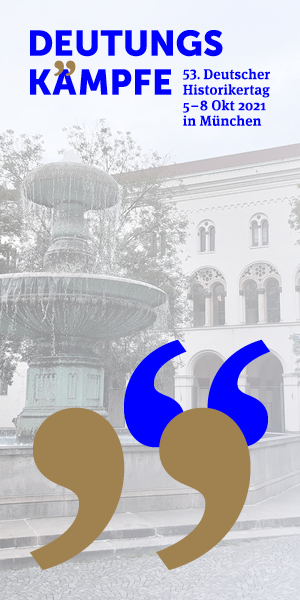
|
|
“Koselleck’s Figures. Perspectives of a Collection”
Workshop, Bielefeld University, 9th September 2021
With the Figure Collection Reinhart Koselleck Bielefeld University has recently acquired an estate that is as unusual as it is and fascinating. Why would a historian, who primarily conducted research on the history of concepts, collect figurines and other material objects? And how should we approach such a collection scientifically? The about 130 objects will be presented at the workshop and then be examined by an interdisciplinary panel of experts with a view to possible research perspectives.

More Information here
Program:
12.15 – 12.45 Reception and round of introductions
12.45 – 13.45 Introduction to the collection and its potential
13.45 – 14.15 Coffee-break with light lunch
14.15 – 14.45 Autopsy of the objects
15.00 – 17.00 Impressions and ideas
17.00 – 17.15 Coffee-break
17.15 – 18.00 Final discussion
Participants:
Judith Blume (Frankfurt/M.)
Bettina Brandt (Bielefeld)
Britta Hochkirchen (Bielefeld)
Caroline Jessen (Marbach)
Katharina Koselleck (Köln)
Sarah Elena Link (Berlin)
Hubert Locher (Marburg)
Mirko Nottscheid (Marbach)
Undine Stabrey (Basel)
Juliane Tomann (Jena)
Please note: : The workshop unfortunately has to take place by invitation only due to the pandemic.
Organizers: Lisa Regazzoni (Bielefeld), Jan Eike Dunkhase (Bielefeld)
2021-07-16 | Diskussionsrunde zum Thema "Der Verlust der Vergangenheit: Historische Erkenntnis und Materialität"
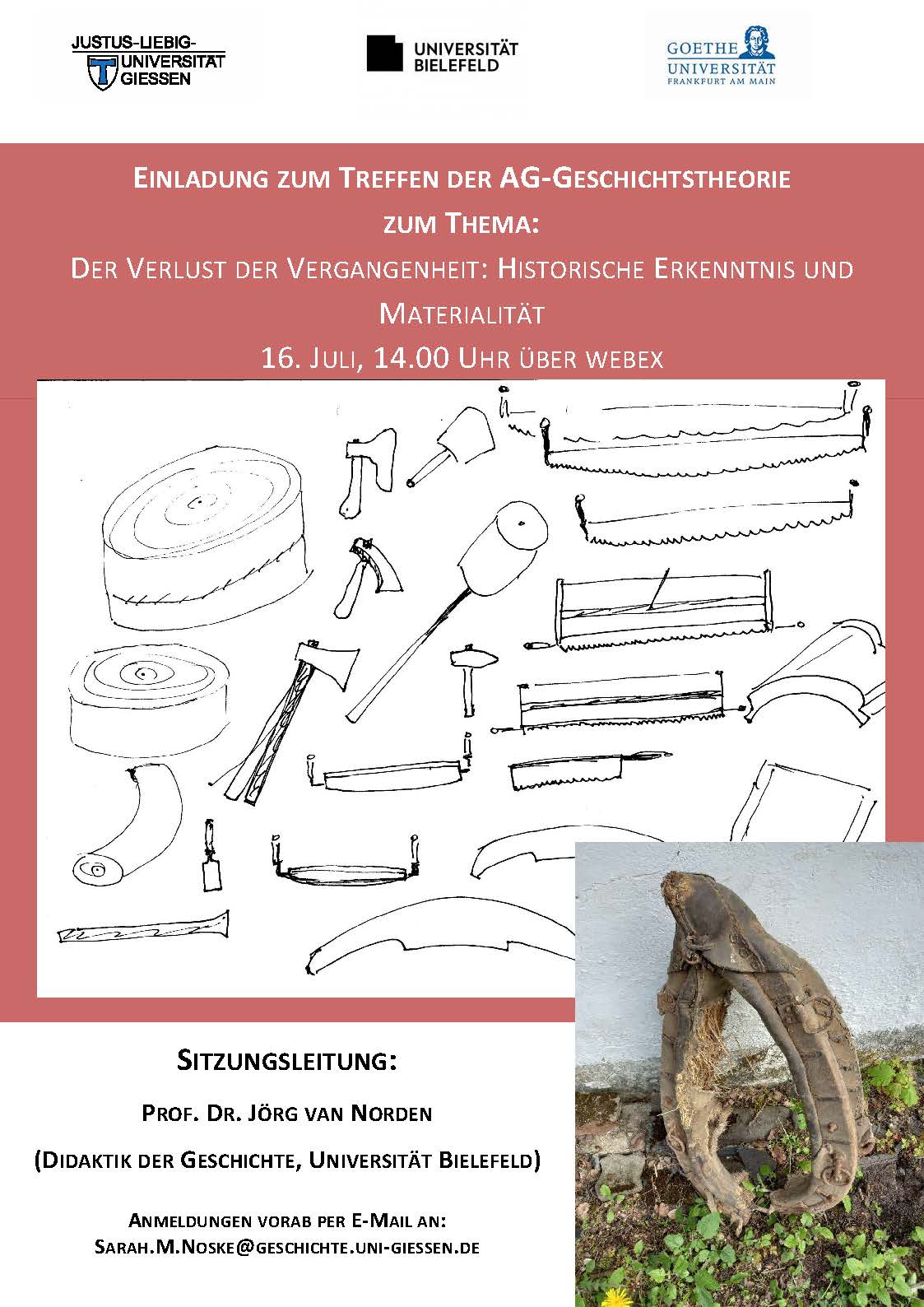
| Sitzungsleitung: Prof. Dr. Jörg van Norden (Universität Bielefeld),
|
2021-06-24 | Achim Landwehr und Sina Steglich:
2. Dominogespräch "Diesseits der Geschichte. Für eine andere Historiographie"
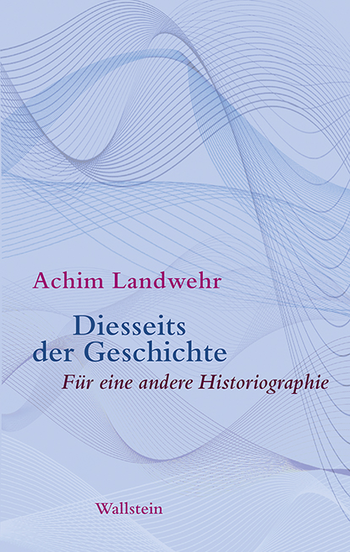
| Zweites Dominogespräch des Zentrum für Theorien in der historischen Forschung zu Gast im Kolloquium Vormoderne,
Teilnahmeinteressierte können sich per E-Mail an theoriezentrale-geschichte@uni-bielefeld.de
|
2021-06-18 | Diskussionsrunde zum Thema "New Materialism"
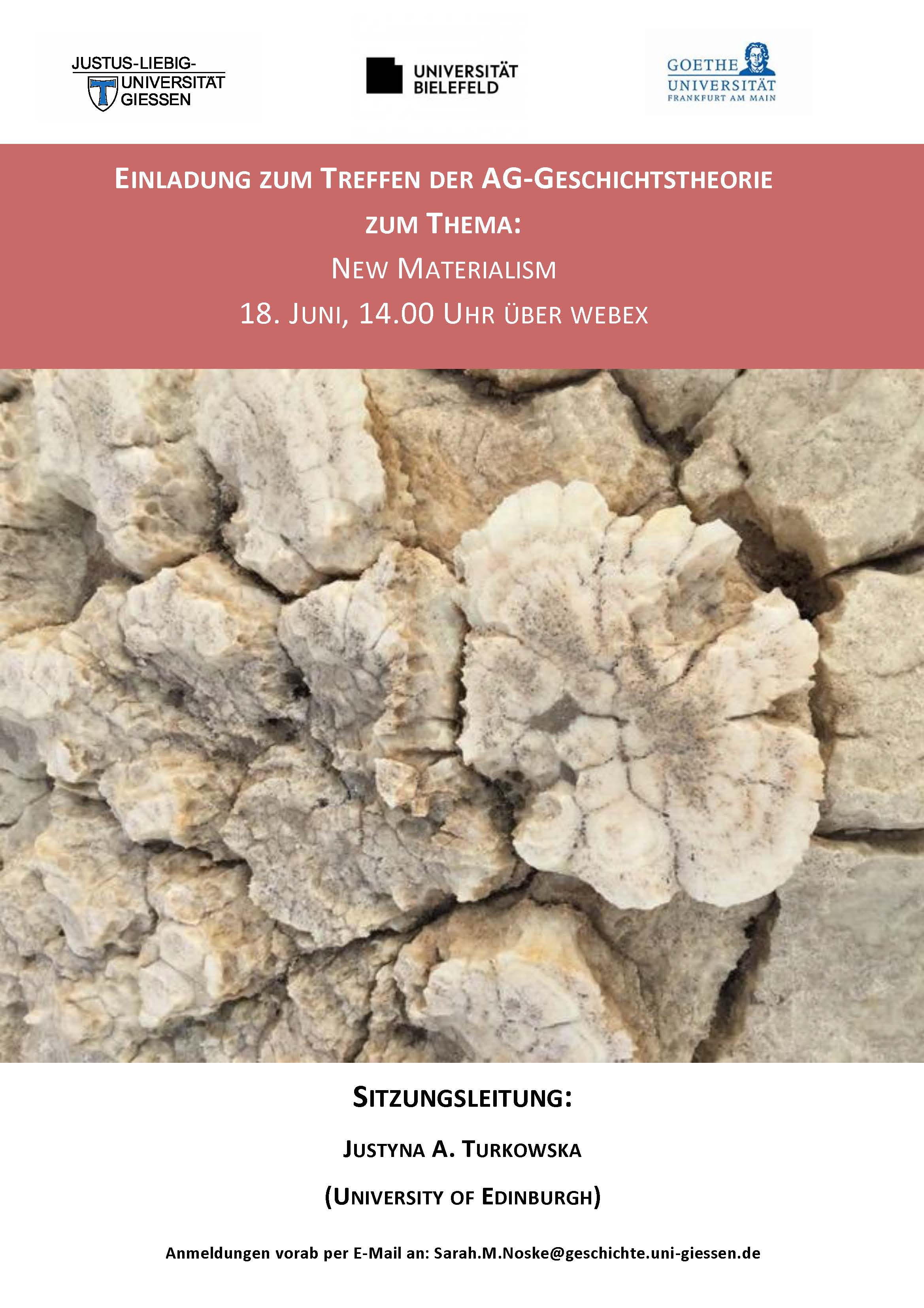
| Sitzungsleitung: Justyna A. Turkowska (Univerity of Edinburgh),
|
2021-09-06 | Undine Stabrey: Unter Glas. Weltbild & Wissenschaft
Vortrag im Rahmen eines Kolloquiums Geschichtskulturen:
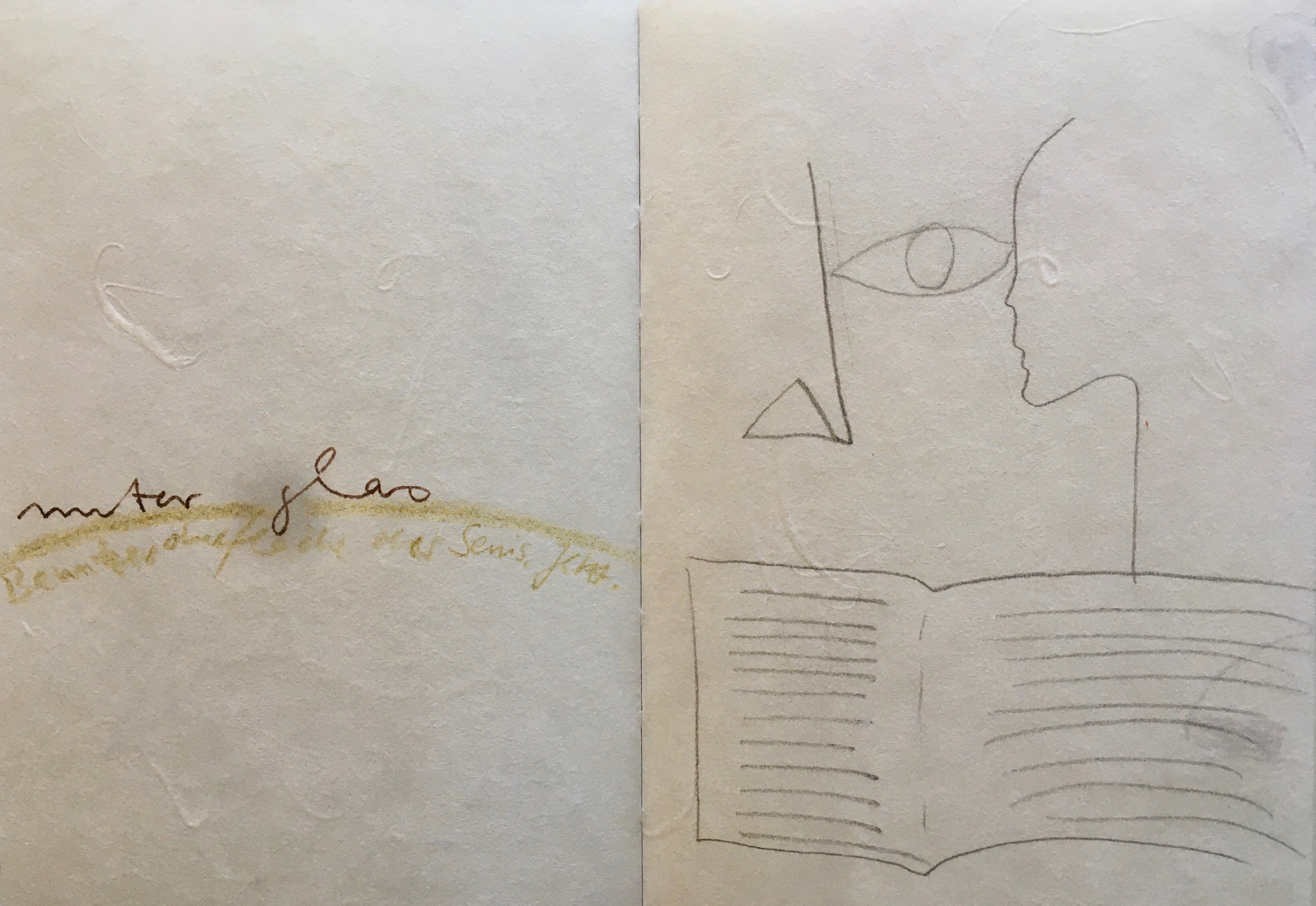
More Information
Der Vortrag möchte aufzeigen, wie Materialität-denken funktioniert hat als wir noch in der Zeitlichkeit der Wissenschaft dachten. Im Modus des Rückblickes argumentiert er eine Epoche Antike bis Digitalität, deren Hauptstimmung das in die Fläche gebrachte Sein ist: die Fläche des Weizens, der Schrift, des metrischen Raumes, der Stadt und diversen anderen Funktionen des sesshaften Seins – samt Charakteristikum der Idee von Raum und Zeit, die diese Jahrtausende zusammenhält. Aus einer archäologischen Perspektive des bedingten Seins wird die Vorstellung von Dingen mit einer Einschätzung digitaler Dinglichkeit irritiert und Materialität mit dem digitalen Weltbild und dem der Materie gedacht. Das hat Auswirkungen auf die Bedingung des Geschichts der Geschichte; theoretisch wie konkret.
Die Veranstaltung findet online via Zoom statt. Teilnahmeinteressierte können sich per E-Mail an alice.neitzel@uni-bielefeld.de anmelden, um die Zugangsdaten zu erhalten.
2021-04-30 | Lisa Regazzoni: Der Zeit auf der Spur: wie Dinge zu Geschichtsdingen werden
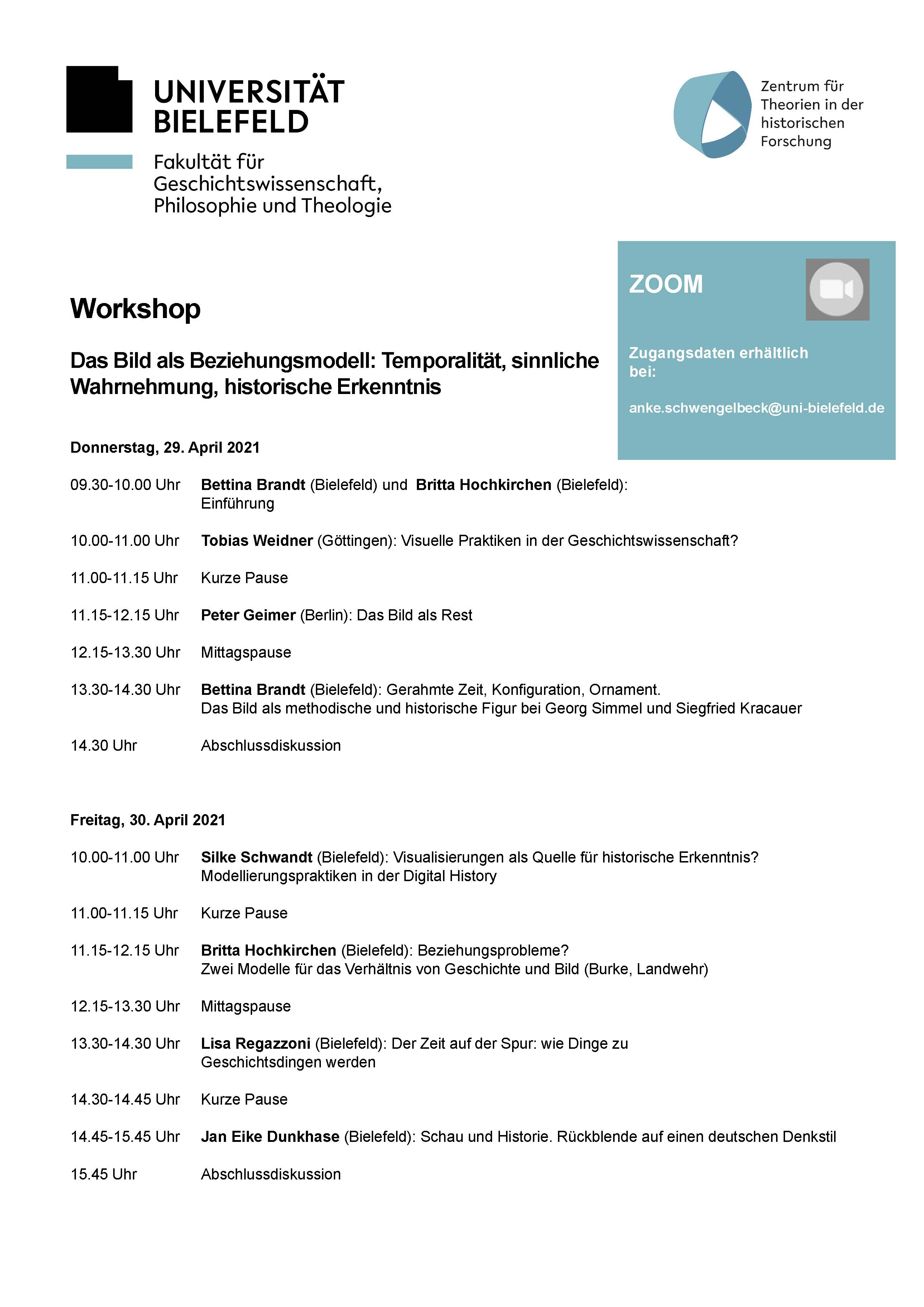
| Vortrag im Rahmen des Workshops "Das Bild als Beziehungsmodell: Temporalität, sinnliche Wahrnehmung, historische Erkenntnisse“ (29.-30. April 2021)
|
Endowment of Reinhart Koselleck’s Figure Collection
On March 20th, Reinhart Koselleck’s family endowed Bielefeld University with his figure collection. It will now be made accessible for research at the Chair for the Theory of History. The approx. 130 objects of varied nature – tin soldiers, busts and miniatures of monuments, as well as figures of horses and horsemen – deserve attention as a material monument and a medium of reflection. Beyond its testimonial character, the collection seeks to promote interdisciplinary approaches to a non-written historical mediality.
More information here
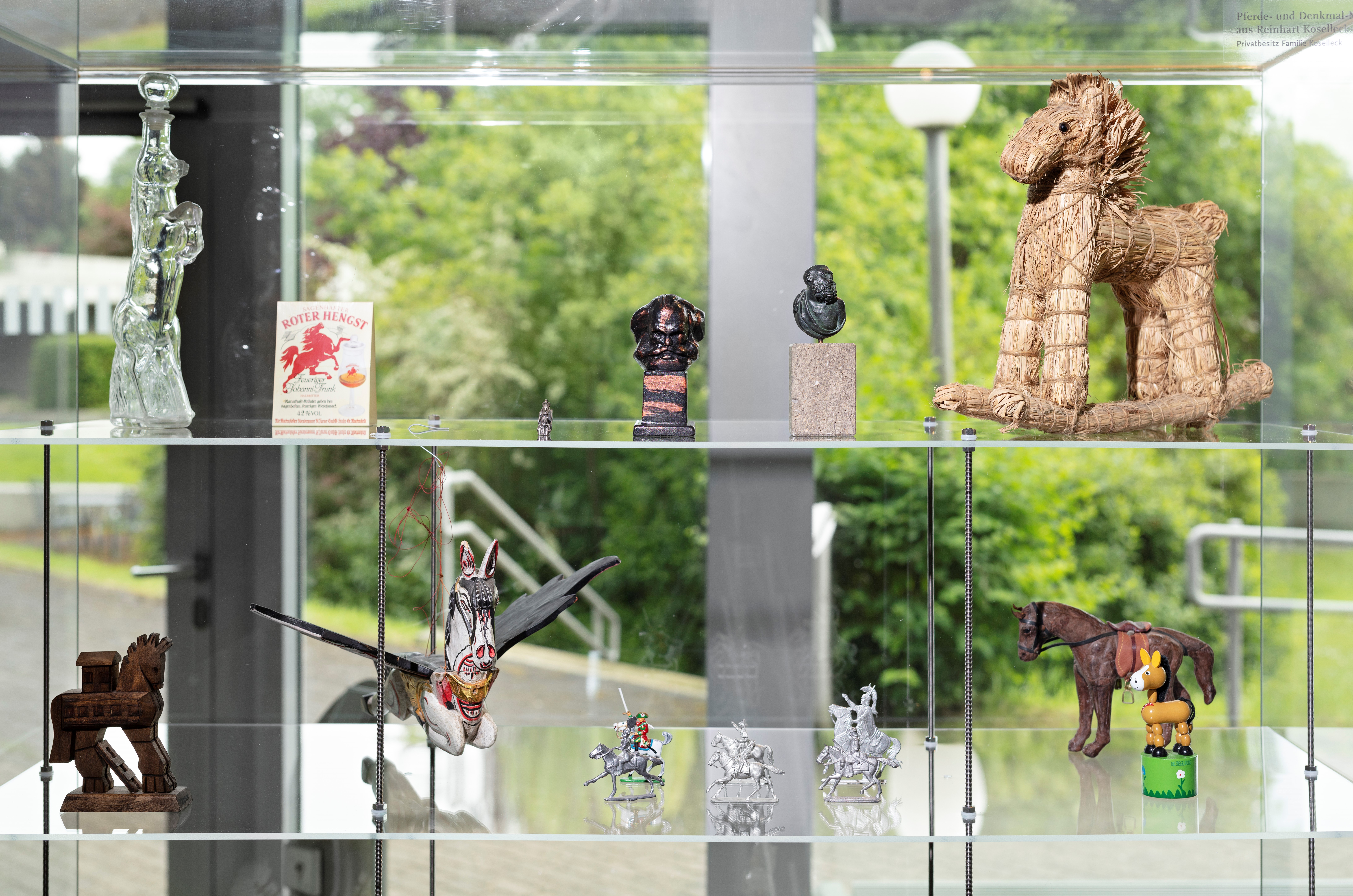
A view of „Reinhart Koselleck's Images of Time“. Photo: Philipp Ottendörfer
Project management: Prof. Dr. Lisa Regazzoni
Research associate: Dr. Jan Eike Dunkhase
2021-04-16 | Diskussionsrunde zum Thema "How History Makes Theory: Current Discussions on Historical Praxis"
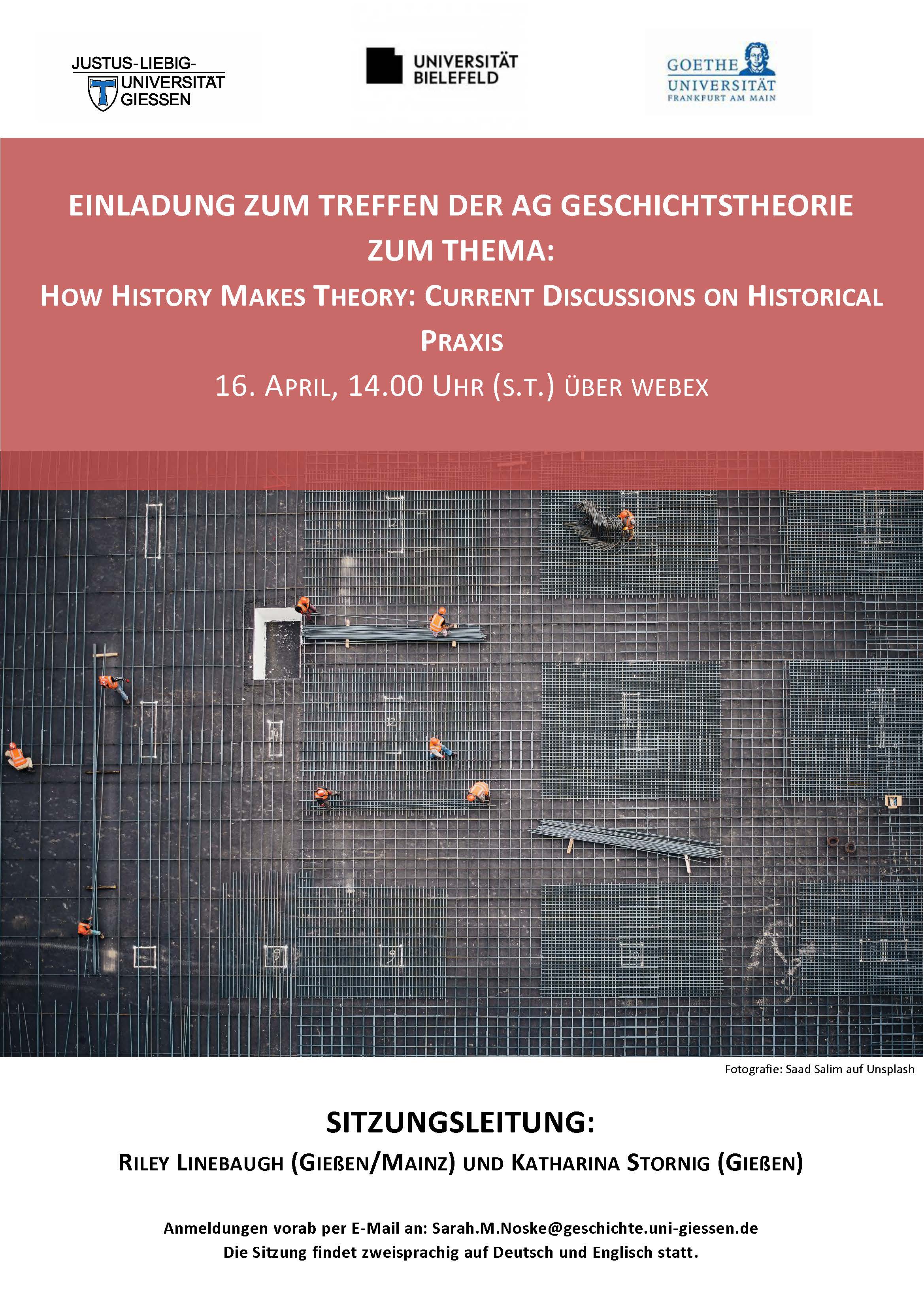
| Sitzungsleitung: Riley Linebaugh (Gießen/Mainz) und Katharina Stornig (Gießen) am 16. April 2021, 14:00 Uhr (s.t.)| WebExOnline-Event – Anmeldungen vorab per E-Mail an: Sarah.M.Noske@geschichte.uni-giessen.de Plakat |
26.02.2021 | Diskussionsrunde zum Thema „Tiergeschichte(n) - Perspektiven und Ansätze“
Sitzungsleitung: Benjamin Roers (Justus-Liebig-Universität Gießen),
am 26. Februar 2021, 14:00 Uhr | WebEx
Online-Event – Anmeldungen vorab per E-Mail an: Sarah.M.Noske@geschichte.uni-giessen.de
Plakat02.02.2020 | Lisa Regazzoni: Geschichtsstoff: Zwei oder drei Dinge, die ich von ihm weiß…
Vortrag im Rahmen des Kolloquiums des Institute for Interdisciplinary Studies of Science, am 2. Februar 2020, 16:00-18:00 Uhr
Die Veranstaltung findet online via Zoom statt. Interessierte können sich per E-mail an eike_inga.schilling@uni-bielefeld.de wenden, um die Zugangsdaten zu erhalten.
Welche Erkenntnisse über die Vergangenheit können Historiker*innen aus materiellen Spuren und Dingen gewinnen? Wie werden solche Spuren in den Rang von Zeugnissen der Vergangenheit erhoben? Und wie bereiten Historiker*innen diese neuen historischen Zeugnisse dann auf, wie vergleichen und analysieren sie sie, kurzum, wie machen sie sie zu Belegen historischer Erzählungen? Welche epistemischen Werte – von der Authentizität bis zur Wahrhaftigkeit – werden diesen Zeugnissen zugeschrieben, gerade im Unterschied zu schriftlichen Quellen und literarischen Erzählungen? Schließlich: Welche politisch-moralischen Vorstellungen oder sogar Ideologeme stehen hinter der wachsenden Beliebtheit, der sich materielle Zeugnisse in der Geschichtswissenschaft erfreuen? Mit Hilfe historischer und gegenwärtiger Untersuchungsobjekte sollen jüngste Positionen zum Erkenntnispotential von Materialität und Dingen inspiziert und kritisch hinterfragt werden.
25.12.2020 | Deutschlandfunk - Wissenschaft im Brennpunkt:
Afrikas Geschichte – Karawanen, Macht und Gold von Vera Pache. Mit einem Interview von Lisa Regazzoni zum europäischen Geschichtskonzept in kolonialen Zeiten.
Link zu dem Feature
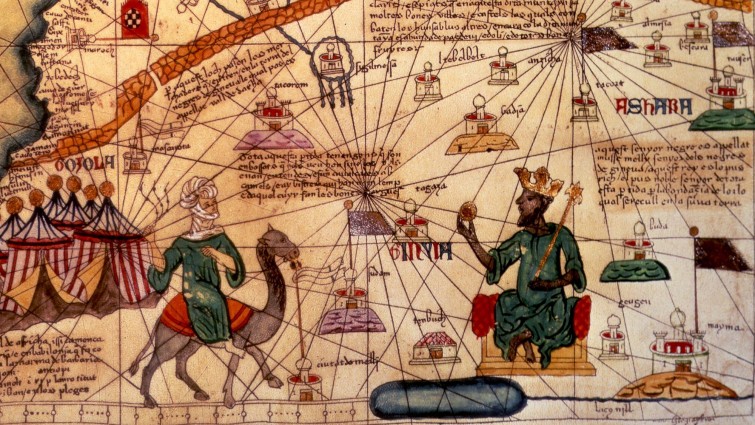
15.01.2021 | Diskussionsrunde zum Thema „Braucht (Geschichts-)Wissenschaft einen Begriff des Wandels?“
Sitzungsleitung: Dr. Iryna Klymenko (Ludwig-Maximilians-Universität München), am 15. Januar 2021, 14:00 Uhr (s.t.) | WebEx
Online-Event – Anmeldungen vorab per E-Mail an: Sarah.M.Noske@geschichte.uni-giessen.de
Plakat16.12.2020 | Hauke Ohls: Objektorientierte Ontologie - alles ist ein Objekt
Vortrag im Rahmen eines Kolloquiums Geschichtskulturen:
am 16. Dezember 2020 | 18:00 – 20:00 Uhr
Weitere Informationen
Die Objektorientierte Ontologie von Graham Harman besagt, dass alles ein Objekt ist und zudem aus vier Teilen besteht. Anhand dieser Grundannahme entwickelt der amerikanische Philosoph eine Theorie, die zum Spekulativen Realismus gezählt wird. In der Anwendung auf Kunstwerke entsteht eine neue Rezeptionssituation, denn die Betrachtenden müssen ebenfalls als Objekt angesehen werden.
Die Veranstaltung findet online via Zoom statt. Teilnahmeinteressierte können sich per E-Mail an alice.neitzel@uni-bielefeld.de anmelden, um die Zugangsdaten zu erhalten.
Neu erschienen:
Lisa Regazzoni
Geschichtsdinge. Gallische Vergangenheit und französische Geschichtsforschung im 18. und frühen 19. Jahrhundert, Berlin/Boston 2020 (Cultures and Practices of Knowledge in History 5). DOI
09.12.2020 | Zeitort Archiv - Etablierung und Vermittlung geschichtlicher Zeitlichkeit im 19. Jahrhundert
Buchpräsentation im Zentrum für Theorien in der historischen Forschung,
am 9. Dezember 2020, 18:00 – 20:00 Uhr
„Zeit, Geschichtlichkeit und Moderne stehen in einem unauflöslichen Zusammenhang. Doch die Frage, wie man Zeit in der Moderne verstehen kann, bleibt oft abstrakt.“
Weiter lesen
02.12.2021 | Podiumsgespräch: Enthülltes Unrecht. Historische und aktuelle Perspektiven auf den öffentlichen Umgang mit Denkmälern
Podiumsgespräch im Kolloquium Geschichtskulturen,
am 2. Dezember 2021, 18:00 – 20:00 Uhr
mit Barbara Frey (Bielefeld) / Gustav Seibt (Süddeutsche Zeitung) / Christina Morina (Bielefeld) & Lisa Regazzoni (Bielefeld)
Die Veranstaltung findet online via Zoom statt. Teilnahmeinteressierte können sich per E-Mail an alice.neitzel@uni-bielefeld.de anmelden, um die Zugangsdaten zu erhalten.
27.11.2020 | Diskussionsrunde zum Thema „Geschichte jenseits des Menschen? Vom Anthropozän und posthumanen Ansätzen“
Sitzungsleitung: Markus Krzoska (Justus-Liebig-Universität Gießen),
am 27. November 2020, 14:00 Uhr (s.t.) | WebEx
Organisation: AG Geschichtstheorie (Justus-Liebig-Universität Gießen, Universität Bielefeld, Goethe-Universität Frankfurt am Main)
Online-Event – Anmeldungen vorab per E-Mail an: Sarah.M.Noske@geschichte.uni-giessen.de
Plakat26.11.2020 | Lisa Regazzoni: Schriftlose Vergangenheiten oder die Geschichtsschreibung an ihrer Grenze
Vortrag im Rahmen des Kolloquiums Vormoderne,
am 26. November 2020, 18:00-20:00 Uhr
Die Veranstaltung findet online via Zoom statt. Teilnahmeinteressierte können sich per E-Mail an rita.gaye@uni-bielefeld.de , um die Zugangsdaten zu erhalten.
17.07.2020 | Diskussionsrunde zum Thema „Sollte man den (aufklärerischen) Begriff des Fortschritts retten?“
Sitzungsleitung: Philipp McLean (Frankfurt am Main),
am 17. Juli 2020, 14:00 Uhr (s.t.) | WebEx
Online-Event – Anmeldungen vorab per E-Mail an: Sarah.M.Noske@geschichte.uni-giessen.de
Plakat

 Deutsch
Deutsch